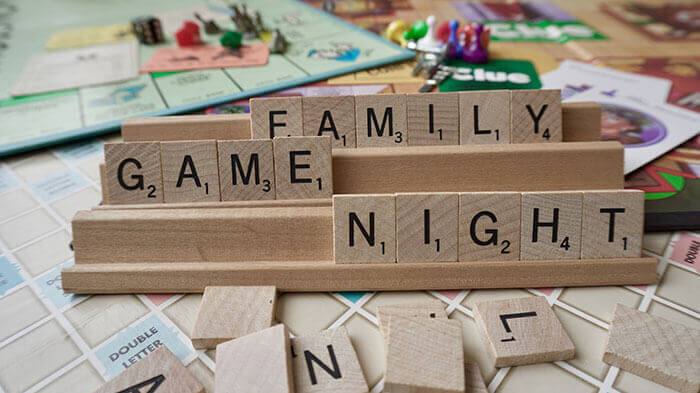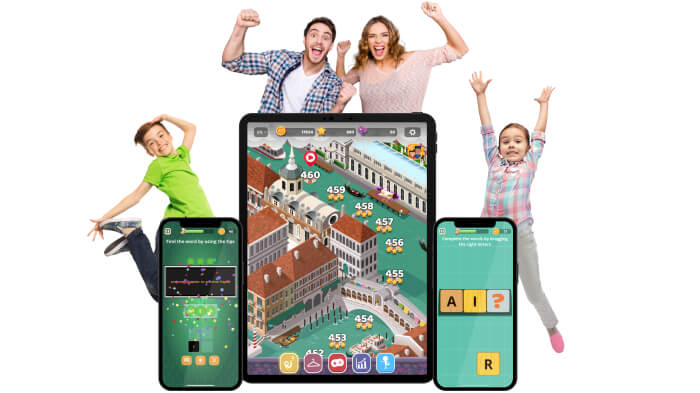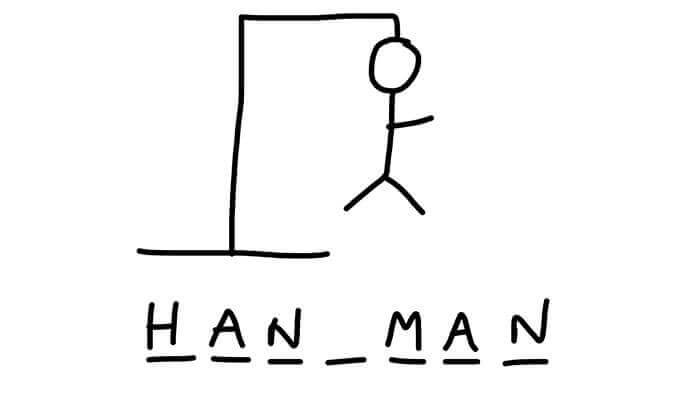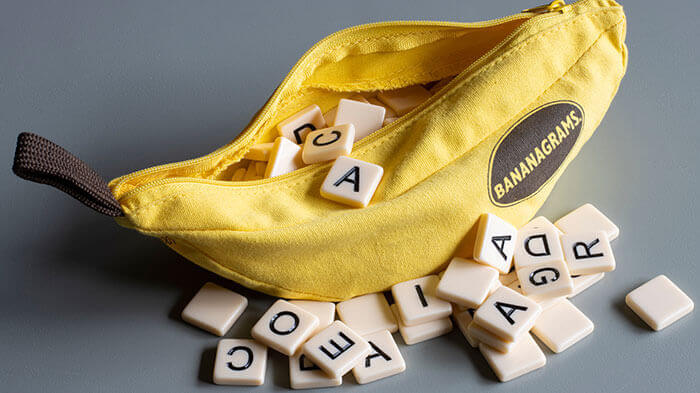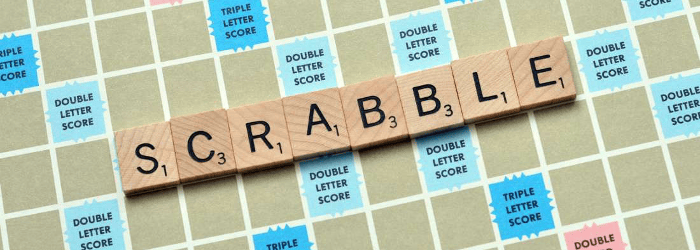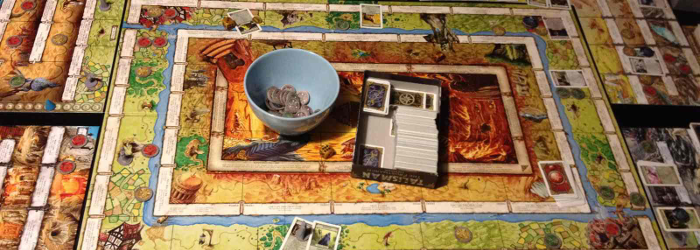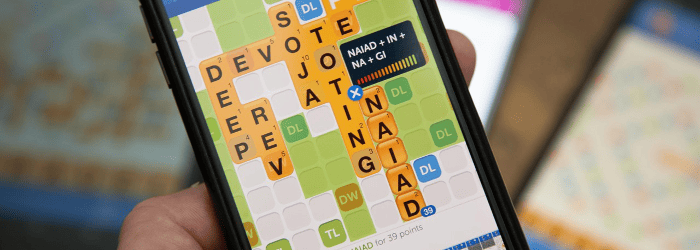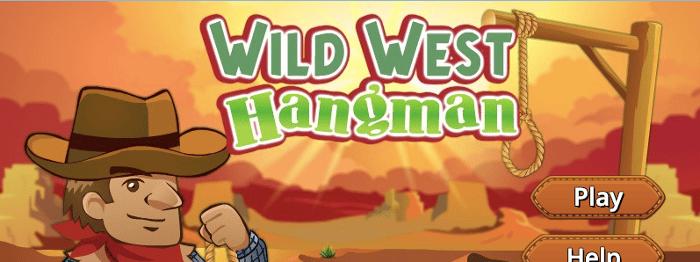Playing word games is one of the most excellent ways to exercise the brain. Besides being fun and beneficial, brain words games improve verbal intelligence, memory, concentration, and problem-solving skills. It also boosts intellectual ability and stimulates creativity! ✨
The Best Brain Words Games
There are many online brain words games, but which ones offer the benefits you need? We’ve collected the best brain words games samples to expand your brainpower to the maximum. Challenge yourself and enjoy training your brain with the most effective games! 🚀
Word Puzzle
Here is a puzzle that includes words and pictures! You need to use both verbal and visual skills to be successful.
Synonym Antonym
One of the best brain games with words! Choose the synonyms & antonyms according to the direction.
Word Generator
Complete the words with missing letters by using your vocabulary and planning skills. Be aware of tricky ones!
Relationship Status
Read the adjective we show and decide which word is related to it below. Comparison skills are as essential as vocabulary!
| ✅ Improves: | Verbal Intelligence |
| ✅ Features: | 15+ Games |
| ✅ Approach: | Academic & Fun |
| ✅ Suitable: | for All Ages |
Word Hunt
Are you a good word hunter? Test your vocabulary and reasoning skills with our complicated riddles!
Word Matching
Find the words according to the highlighted category! Use your conceptualization and vocabulary skills effectively.
Word Memory
Challenge your vocabulary and verbal memory at the same time! You must pay attention; the time is ticking!
Split Words
In free brain games, Split Words has a special place. Are you brave enough to complete the words against time?
Top 8 Word Games to Play at Home
Are you looking for an entertaining game for the next family game night? Playing word games can be more fun than you think! Discover the most engaging brain words games to play at home with your loved ones in light of our list. ✨
1. Scrabble
There is no doubt that Scrabble is one of the most popular word games for developing vocabulary, strategic thinking, and verbal memory.
These are what make Scrabble excellent, but there is one more advantage of this word game that will teach you how to think faster. Scrabble can be played with a wide range of age groups. Even grandparents and grandkids enjoy doing their bests against each other!
2. MentalUP
The award-winning MentalUP offers 150+ word games to maximize your skills while having so much fun!
All the games of MentalUP are created by academicians, scientists, and game developers. That’s why they are that entertaining and beneficial! The word games aim to develop not only your verbal intelligence but also your visual intelligence, attention, memory, and logic skills.
You can play all those games in a family plan (up to 3 users) and compare your results with your peers and other family members! 👨👩👧
All the games are suitable for all ages because we offer your daily program according to your performance. It means you can never feel bored with any of these games! 🥳
Surprise your brain and reach beyond your limits with the most creative word games of MentalUP! 🚀
START TODAY
3. Words Within a Word
Here is another perfect word game, Words Within a Word! It is so easy to play this game at home or in the classroom. You just need some paper and a pencil, then think about a long word.
For example, the determined word is “unadulterated.” Now, the players should create new words from the main word, like “adult, deal, tear, dune, etc.”. Set the timer for 5 minutes, and let’s see which player will list more words!
You may count only 4-letter words or more to make this game more challenging. Good luck!
4. Synonym Hunter
The best brain games words list must include Synonym Hunter! This game is suitable for both kids and adults.
Choose a word like “happy,” and then find its synonyms like “joyful, cheerful, merry, etc.” You can count them in turn with the other players one by one or grab a piece of paper and pencil, then make a list to see which player will have the highest word number!
5. Storytelling & Order of Words Game
Brain games order of words can create a real difference to support a healthier brain. All the players should order the words so carefully to create a beautiful story.
Some people prefer to play it sentence by sentence, but building a sentence with each word of different players is much more challenging.
This game is not only great for verbal intelligence but also for creative intelligence.
6. Hangman
Who could need a detailed introduction to Hanging Man? It’s one of the most popular word games ever!
You need some paper, a pen, and another player to play this game. Choose a word in your mind, and draw short lines as much as each letter.
The player starts by picking a letter. If he/she finds a letter from the word, you write it. If it’s a wrong guess, you should start drawing the platform step by step, the rope, and body parts such as the head, torso, two arms, and two legs.
When the player reveals the word before the body drawing ends, accepted as the round winner! If you want to make it more difficult, Hangman can be played as one of the words and numbers brain games
7. Bananagrams
Bananagrams is quite a simple but challenging game. You don’t need any paper or board to play it; only the bag of tiles is enough for spending a great deal of time.
2 to 6 players are allowed, and both adults and kids can enjoy playing it. Basically, you pick your starting tiles according to the number of players and start making their intersecting word grid!
The first one who ends their tales will be the winner. Remember to call out “Bananas!” when you’re done!
8. Letter Jungle
Here is an easy game to play, but it doesn’t mean that Letter Jungle is easy!
All you need is some paper and a pen. Choose 7 random letters with 2 vowels at least. Then set the timer for 3 minutes. Now it’s time to start creating words from the Letter Jungle!
According to the difficulty level you want to play, you can decide 3 minutes is enough or not. It’s one of the brilliant brain words games to play at home or even on a bus or airplane!
How Words Games Work Out Your Brain
Do you wonder what makes brain words games such a perfect workout for the brain? There are many beneficial features to talk about, but here are the most effective ones:
-
Word Games Improve Vocabulary
The best part of word games is that they encourage you to think deeply, remember the words you don’t use often, or learn new words to use them. After a while, players can feel that finding words are easier, which is perfect for their daily lives to express themselves better too.
-
They Strengthen Memory
Short-term memory and long term memory are skills you must use when playing word games. If you want to get a good score, you should remember all the complex, uncommon, maybe too old words. Players easily observe that they start remembering all these “impossible to recall” words in time if they keep playing memory games. This benefit is essential, especially for memory games for seniors.
-
Brain Words Games Support Thinking Strategically
Have you ever realized that you are getting a significant improvement when you play the same game over and over again? This is normal because word games support strategic thinking. It makes players’ performances get better and is also pretty useful for daily life problems and be better at exams such as 8 plus.
-
People of All Ages Can Play Word Games Together
The great advantage of these games is anyone can play them if they have basic literacy. It means that grandparents can play these games with their grandchildren, or these games can be the star of family game nights.
Word games are excellent choices to play with your loved ones, but you don’t need someone to sharpen your mind! 🙌
Download MentalUP and start discovering 150+ words games that are developed on a scientific base. 🧠
MentalUP, the award-winning app, is highly beneficial for both kids and adults! Our algorithm analyses your level in detail and recommends games based on your performance. 📊
For starting on a journey of constant development, MentalUP is the most beneficial step! 🤩
FAQ About Brain Words Games
What word games are good for the brain?
Some brain games split words, for example, are great choices for the brain. You can check the games and activities we’ve suggested in this article. Also, you can download MentalUP, the best brain games words app, with thousands of brain games.
What are brain twisting games?
Most word games can be considered brain-twisting games. You can personalize some of their rules to make them more challenging. All the games we’ve compiled and offered on MentalUP are wonderful examples of brain-twisting games.
Are there any free word games?
There are many free and paid word games that people can play. Check out the list we’ve prepared for you in this article for free online word games. You can read the “Top 8 Word Games to Play At Home” section for some free word games to play with loved ones.
What is Picto game?
Picto game or Pictoword is one of the entertaining brain words games. You can play it alone or with your friends, making the game a good choice for many people. Players need to guess the word according to two different pictures.
27 August 2018
Publish Date: 18 April 2022
Lauran Cole
If you want to improve your writing, maybe it’s time to ditch all the writing books and podcasts and play some word games instead.
Yes, seriously! Word games and writing games are great ways to develop your vocabulary, to help you think more deeply about words, to have fun with story and structure, and to get a lot of fun out of writing.
But games can be a great way to:
- Develop your vocabulary
- Help you think more deeply about words
- Become more fluent in English (if it’s a foreign language for you)
- Invent and develop characters
… and much more.
After the list of 50 writing games, I’ve given you a top ten that I think are particularly great for kids who want to practice their writing skills. Many of the other games are suitable for children, too, so by all means try out other games as a family if you want to.
Of course, there are loads of online games (and quizzes and tools) that you can use to improve your writing skills, and I will be talking about some of the best of those. But there are also lots of tried-and-tested classic games that you can play with pen and paper, or using cards and dice … and we’ll be taking a look at those first.
5 Pen and Paper Word Games
I’ll start with the simplest games: pen and paper ones that you can play pretty much anywhere, so long as you have a pen.
All of these are suitable for children, and some (like crosswords) are enjoyed by many adults too.
#1: Hangman (2+ players)
Hangman is a classic word game for two players. One player thinks of a word and writes down dashes to represent the number of letters. The other guesses letters of the alphabet. Correct letters are inserted into the word; incorrect letters result in another segment of the “hangman” being drawn.
This is a great game for developing spelling and vocabulary. If you’re playing it with small children, you can do it without the perhaps rather unpleasant “hangman” element, and just count how many guesses each player takes!
#2: Crosswords (1 player)
A crossword is a grid of white and black squares, where each white square is one letter of a word. The words intersect. You can find crosswords in many newspapers and magazines (on all sorts of subjects), and you can buy booklets and books full of them. Some crosswords are “cryptic”: great if you like brainteasers. Others have more straightforward clues.
Crosswords are great if you want to learn new words and definitions, or (at the cryptic end of the scale) if you enjoy playing with words and language. Simple ones are suitable for fairly young children, with a little help.
#3: Word searches (1 player)
A word search has a grid (often 10×10 or more) filled with letters, and a number of words written alongside or beneath the grid. The person completing the word search needs to find those words within the grid.
Most word searches are easy enough for children, though younger children will struggle with backward and diagonal words. They’re a good way to get used to letter patterns and to improve spelling – and because word searches rely on matching letters, even children who can’t read well will be able to complete simple ones.
#4: Consequences (2+ players, ideally 4+)
This is a fun game with a group of people, as you get a wild and wacky mix of ideas. Each player writes down one line of a story and folds the paper over before passing it around the table to the next player. The very simple version we play has five lines: (1) A male name, (2) The word “met” then a female name, (3) “He said …” (4) “She said …” (5) “And then …”
Once all five stages are complete, the players open out the papers and read out the results. This can be great for sparking ideas, or as a way to encourage reluctant writers to have a go.
#5: Bulls and Cows (2 players)
This game, which can also be called “Mastermind” or “Jotto” involves one player thinking up a secret word of a set number of letters. The second player guesses a word; the first player tells them how many letters match in the right position (bulls) and how many letters are correct but in the wrong position (cows).
Our five year old loves this game, and it’s been a great way to develop her spelling and handwriting as well as logical thinking about which letters can or can’t be the correct ones after a few guesses.
10 Board and Dice Games
These are all games you can buy from Amazon (or quite probably your local toyshop). They’re fun ways to foster a love of writing within your family, or to share your enjoyment of words with your friends.
#1: Scrabble (2+ players)
A classic of word games, Scrabble is a game played with letter tiles on a board that’s marked with different squares. (Some squares provide extra points.) Letters have different points values depending on how common they are. The end result of scrabble looks like a crossword: a number of words overlapping with one another.
If you want to develop your vocabulary (particularly of obscure two-letter words…) then Scrabble is a great game to play. It’s suitable for children too, particularly in “Junior” versions.
#2: Boggle (2+ players)
This is less well known than Scrabble, but it was one I enjoyed as a child. To play Boggle, you shake a box full of dice with a letter on each side, and the dice land in the 4×4 grid at the bottom of the box. You then make as many words as you can from the resulting face-up letters.
Again, this is a good one for developing vocabulary – and it can be played by children as well as by adults. You need to write down the words you come up with, which can also be good for developing handwriting.
#3: Pass the Bomb (2+ players)
It’s very simple to play: you deal a card for the round pass a “bomb” around the table and when it goes off, the person holding it loses. Before you can pass the bomb on during your turn, you need to come up with a word that contains the letters on the card.
It’s a fun family or party game, and can work well with a wide range of ages. It’s a great way to help children think about letter patterns, too, and to develop vocabulary and spelling.
#4: Story Cubes (1+ players)
There are lots of different versions of these available, and they all work in a similar way. The open-ended game has a set of cubes that you roll to create ideas for a story that you can tell along with the other players. If you prefer, you can use them to come up with stories that you’re going to write on your own.
There are lots of different ways you can use them: as writing prompts for a school class or group, to make up a bedtime story together with your children, for getting past your own writers’ block, or almost anything you can think of.
#5: Apples to Apples (2+ players)
Apples to Apples has red cards (with the name of a person, place, thing, etc) and green cards (with two different descriptions): the player with a green card selects one of the descriptions, and others have to choose a card from their hand of red cards. The judge for that game decides which red card best matches the description.
If you want to develop your vocabulary (or your kids’), this could be a fun game to play. There are lots of expansions available, plus a “junior” version with simpler words. (If you’re playing with adults, you might also want to consider Cards Against Humanity, a decidedly not-kid-friendly game that works in a very similar way.)
#6: Letter Tycoon (2+ players)
In this game, you have a hand of 7 cards which you can use in conjunction with the 3 “community cards” to create a valuable word. It’s a more strategic game than some others, with aspects of finance (like patents and royalties) involved too – if you’re a budding tycoon, you might really enjoy it.
Because not all the game strategy depends on simply being good with words, it doesn’t matter if some players have a larger vocabulary than others. It’s suitable for children, too, so you can play it as a family game.
#7: Dabble (2+ players)
Dabble is a family-friendly game where you compete with other players to be the first to create five words (of 2, 3, 4, 5 and 6 letters) using your 20 tiles. It’s very simple to get the hang of … but coming up with the words might be more challenging than you expect!
If you enjoy Boggle or Scrabble, you’ll probably have fun with Dabble. It’s a great way to develop both spelling and vocabulary, and to have fun with words.
#8: Upwords (2+ players)
Upwords is like 3D Scrabble: you can stack tiles on top of other tiles to create new words. The board is smaller than a Scrabble board (and doesn’t have double and triple word score squares) so it’s not as complex as it might initially sound.
Like similar games, it’s a great one for building vocabulary and for developing your spelling. It’s suitable for kids, too, so it could be a great game for the whole family.
#9: Tapple (2+ players)
Tapple has a wheel, with most of the letters of the alphabet on it, and lots of different “topic cards” that cover 144 different categories. There are lots of different ways you can play it – the basic rules are that each player has to think of a word that fits the topic within 10 seconds, but that word can’t start with a starting letter that’s been used previously.
While small children might find it a bit too challenging or frustrating, due to the short time limit, this could be a great game for older children looking to extend their vocabulary. All the categories are suitable for kids.
#10: Last Word (2+ players)
In Last Word, players have to come up with answers to “Subject” and “Letter” combinations, racing to get the last word before the buzzer. It works a bit like a combination of “Tapple” and “Pass the Bomb”.
You can easily play it with a large group (there are tokens for up to 8 players, but you could add more without affecting the gameplay). It’s a great way to develop vocabulary and, to some extent, spelling.
5 Roleplaying Games
While my geeky tendencies have been reined in a bit since I had kids, I’ll admit I have a great fondness for roleplaying games: ones where you come up with a character (often, but by no means always in a magic-medieval setting) and play as them. These are some great ones that you might like to try.
#1: Dungeons and Dragons (3+ players)
Although you might never have played Dungeons and Dragons, I’m sure you’ve heard of this classic roleplaying game that’s been around since 1974 and is now onto is 5th edition. It takes rather longer to get to grips with than a board or card game: to play, you need a “Dungeon Master” (essentially the storyteller of the game) and at least two players (who each control a character), plus rulebooks and a lot of different dice.
It’s a great game for developing the “big picture” aspects of writing, like the ability to construct a plot and a story (if you’re the Dungeon Master) and the skills involved with creating a character, giving them a backstory, and acting “in character” as them (if you’re one of the players).
#2: Amazing Tales (1 parent, plus 1 or 2 children)
This is a kid-friendly RPG aimed at parents who want to create a story with their child(ren). It’s like a very simple version of Dungeons and Dragons, and has straightforward but flexible rules. You can play it with a single six-sided dice – though it’s better if you have four dice (with six, eight, ten and twelve sides).
If you want to encourage your child’s creativity and have fun creating stories together, this is a wonderful game to play. The rulebook contains lots of ideas and sample settings, with suggested characters and skills … but you can come up with pretty much any scenario you like.
#3: LARP (Live Action Roleplay) (lots of players)
Over the past decade or so, LARP has become a bit more mainstream than it once was. It’s short for “Live Action Roleplay” … which basically means dressing up as your character and pretending to be them. It’s a bit like Dungeons and Dragons crossed with improv drama.
The nature of LARP is that it needs quite a lot of people, so unless you have loads of friends to rope in, you’ll want to join an organised LARP – there are lots out there, covering all sorts of different themes, from traditional fantasy ones to futuristic sci-fi ones. Some are suitable for children, but do ask event organisers about this. They won’t necessarily involve any sort of writing, but can be a great way to explore characters and dialogue.
#4: MUDs (lots of players)
MUDs, or “multi-user dungeons” have been around since the early days of networked computing in the ‘70s, and are the forerunners of games like Fortnite and World of Warcraft. They’re now distinctly retro-looking text-based online games, where players create a character and interact with other characters and the world.
Like other types of roleplaying game, they’re a great way to practice storytelling and character-development skills. They also involve a lot of writing – so they can be useful for things like vocabulary and spelling. Some are suitable for children, but as with anything online, do ensure your children know how to be safe (e.g. by not giving out their full name, address, etc).
#5: Online Forum Games / Forum Roleplaying (2+ players)
Some fan communities write collaborative fanfiction through forums (here’s an example), with different people posting little pieces as different “characters” to continue a story. These can be quite involved and complex, and they can be a great way to learn the skills of telling a long, detailed story (e.g. if you’re thinking of writing a novel).
They’ll probably appeal most to writers who are already producing fanfiction on their own, and who have a fair amount of time for the back-and-forth required for forum roleplaying. Again, if your child wants to get involved with this type of roleplaying, do make sure you monitor what they’re doing and who they’re interacting with.
10 Word Games You Can Play on Your Phone
These days, many writers are more likely to have their phone to hand than a pen and paper … and to be fair, there’s nothing wrong with that. You can easily make notes on a phone, whether by tapping them in or by recording them. If you find yourself with a bit of time on your hands, why not try one of these writing-related games?
Note: all of these are free to download, but most allow in-app purchases, and you may find you need to make a purchase to get the most out of them.
#1: Bonza Word Puzzle
This game is a bit like a deconstructed crossword: you get bits of the puzzle and you drag them together to form words that will all match with the clue. If you’re a fan of crosswords and want something a bit different, you might just love it.
It’s a great way to think hard about letter patterns and how words are put together, so it might be a good game for older children who’re looking to develop their spelling and vocabulary, too.
#2: Dropwords 2
Dropwords 2 (a rewrite of the original Dropwords) is a word-finding puzzle where letters drop from the top of the screen: if you remember Tetris, you’ll get the idea. It’s a bit like Scrabble or Boggle, and you have to race the clock to make letters out of the words on the screen.
With six different modes (“normall”, “lightning”, “relax”, etc), it’s suitable for children and for people who are learning English, as well as for those wanting to really challenge their vocabulary skills.
#3: Spellspire
Spellspire is a fantasy-style game where you select letters from a grid to create words: the longer the word, the bigger the blast from your magic wand! You can kill monsters, buy better equipment, and make your way to the top of the Spellspire.
If your kids aren’t very motivated to practice their spelling, this could be a great game for them. (Or, let’s face it, for you!) You can also choose to play it against your Facebook friends, adding a competitive element.
#4: TypeShift
This is a relatively simple game that lets you create words from letters arranged on different dials. There are a couple of different ways you can play: by trying to use all the letters on the dials at least once to create words, or by tackling the “Clue Puzzles”, which are a bit like crossword clues.
Again, if you want to develop your spelling and vocabulary, this is a straightforward game that you can use to do so. You can buy extra puzzle packs at a fairly reasonable price, if you find that you want to play it a lot.
#5: Wordalot
This crossword app uses pictures rather than written clues, which is a fun twist. You can use coins to get hints (you can earn these through the game, or purchase them with real money).
If you enjoy doing crosswords but want something a bit different, give this one a try. You might find that as well as helping you develop your spelling and vocabulary, it’s a great way to develop your lateral thinking as you puzzle out the clues.
#6: WordBrain
This game is another one where you have to find hidden, scrambled words within a grid. There are loads of different levels (1180!) and so this could keep you busy for a long time. You can purchase hints – this could potentially see you clocking up quite a spend, though.
All the words are appropriate for children (though some are tricky to spell), so your kids might well enjoy this game too, as a way to develop their spelling and vocabulary.
#7: Ruzzle
Ruzzle works like Boggle, with a 4×4 grid of letters that you use to make words (the letters must be adjacent to one another). You can play it against friends, or simply against random players.
Like the other apps we’ve looked at, it’s a good one for developing your vocabulary and spelling. Some players said it included too many ads, so this is something to be aware of if you plan to use the free version rather than upgrading.
#8: WordWhizzle Search
This is a word search type game with loads of different levels to play. If you enjoy word searches, it’s a great way to carry lots around in your pocket! You can play it alone or with Facebook friends. It’s easy to get to grips with, but the levels get increasingly tricky, so you’re unlikely to get bored quickly.
As with other apps, this is a great one for developing your spelling and vocabulary. Each level has a particular description (words should match with this), so you have to avoid any “decoy” words that don’t match.
#9: 7 Little Words
This game works a bit like a crossword: each puzzle has seven clues, seven mystery words, and 20 tiles that include groups of letters. You need to solve the clues and rearrange the letter types so you can create the answers to the mystery words – so it’s also a bit like an anagram.
There are five different difficulty levels (“easy” to “impossible”) and each game is quick to play, so this could be a good one for kids too. Again, it’s a great way to develop vocabulary and spelling.
#10: Words With Friends
This classic word-building game is hugely popular, and you can play against your Facebook or Twitter friends, or against a random opponent. It works just like Scrabble, where you have seven letter tiles and add them to a board.
You can chat with the opponent in a chat window, so do be aware of this if you’re allowing your kids to play. The game is a great way to develop vocabulary and spelling, and you can play it fairly casually because there’s no time limit on your moves.
10 Word Games You Can Play in Your Browser
What if you want a writing-related game you can play while taking a break at your computer? All of these are games that you can play in your browser: some involve a lot of writing and are essentially story-telling apps, whereas others are essentially digital versions of traditional pen and paper games.
Unless otherwise noted, these games are free. With some free browser games, you’ll see a lot of ads. If this annoys you, or if you’re concerned that the ads may be unsuitable for your children, you may want to opt for premium games instead.
#1: Wild West Hangman
This is a digital version of Hangman, which we covered above. You choose a category for words (e.g. “Countries” or “Fruits And Vegetables”) and then you play it just like regular Hangman.
It’s simple enough for children – but it only takes six wrong guesses for your cowboy to be hanged, too, so it could get frustrating for younger children.
#2: Word Wipe
In Word Wipe, you swipe adjacent tiles (including diagonals) to create words, a bit like in Boggle. The tiles fall down a 10×10 grid (moving into the blank spaces you’ve created when your word disappears from the grid) – your aim is to clear whole rows of the grid.
Since the easiest words to create are short, simple ones, this is a great game for children or for adults who want to get better at spelling.
#3: Sheffer Crossword
As you might expect, this is a crossword game! There’s a different free puzzle each day, and you can choose from puzzles from the past couple of weeks. It looks very much like a traditional crossword, and you simply click on a clue then type in your answer.
The clues are straightforward rather than cryptic, though probably not easy enough to make this a good app for children or for English learners. If you’re a fan of crosswords, this will definitely be a great way to develop your vocabulary, though.
#4: Twine
Twine is a bit different from some of the other games we’ve looked at: it’s a tool for telling interactive stories (a bit like the old “Choose Your Own Adventure” books, or a text-based adventure game). You lay out your story as different cards and create connections between them.
If you want to experiment with interactive fiction, this is a simple, code-free to get started – as reviewer Kitty Horrorshow puts it, “if you can type words and occasionally put brackets around some of those words, you can make a Twine game”. It’s a great way to deepen your understanding of story, plot and narrative.
#5: Storium
Like Twine, Storium is designed to help you tell stories … but these stories are written in collaboration with others. (There’s a great review, with screenshots, here on GeekMom.) You can either join a story as a character within it, or you can narrate a story – so this is a great game for building lots of different big-picture fiction-writing skills.
It’s suitable for teens, but probably involves a bit too much writing for younger children. If you’d like to write fiction but the idea of creating a whole novel on your own seems a bit overwhelming, or if you enjoy roleplaying-type games (like Dungeons and Dragons), then you might just love Storium.
#6: Words for Evil
This game combines a fantasy RPG setting (where you fight monsters, get loot, gain levels and so on), with word games to play along the way. It could be a good way to encourage a reluctant young teen writer to have fun playing with words – or you might simply enjoy playing it yourself.
The word games work in a very similar way to Word Wipe, so if you found that game frustrating, then Words for Evil probably isn’t for you!
#7: First Draft of the Revolution
This game is an interactive story, told in the form of letters (epistolary). It comes at writing from a much more literary angle than many of the other games, and if you’ve studied English literature or creative writing, or if you teach writing, then you might find it particularly interesting.
The graphics are gorgeous – playing the game is like turning the pages of a book. To play First Draft of the Revolution, you make choices about how to rewrite the main character (Juliette’s) draft letters – helping you gain insight into the process of drafting and redrafting, as well as affecting the ongoing story.
#8: Writing Challenge
Writing Challenge can be used alone or with friends, creating a collaborative story by racing against the clock. You can use it as an app on your phone, as well as on your computer, so you can add to your stories at any time.
If you struggle to stay motivated when you’re writing, then Writing Challenge could be a great way to gamify your writing life – and potentially to create collaborative works of fiction.
#9: Plot Generator
Plot Generator works a bit like Mad Libs: you select a particular type of story (e.g. short story, movie script, fairytale) then enter a bunch of words as prompted. The website creates the finished piece for you. There are also options for story ideas (essentially writing prompts), character generators, and much more on the site.
If you’re stuck for an idea, or just want to play around a bit, Plot Generator could be a lot of fun. Some of the options, like Fairy Tale, are great to use with young children – others may not be so suitable, so do vet the different options first.
#10: The Novelist ($9.99)
The Novelist follows the life of Dan Kaplan, a struggling novelist who’s also trying to be a good husband and father. You can make choices about what Dan should do to reach his goals in different areas of his life – and the decisions you make affect what happens next in the game. You are a “ghost” in the house, learning about and influencing the characters.
While there’s not any actual writing involved in the game, it could be a thought-provoking way to explore how writing fits into your own life.
10 Games to Help You Learn to Type
Typing might seem like an odd thing to include on a list of writing games. But so much of writing involves being able to type – and if you’re a slow typist, you’ll find that your fingers can’t keep up with your brain! While most people find that their typing does naturally improve with practice, these games are all quick ways for you (or your kids) to get that practice in a fun way.
Obviously, all of these games should help to improve typing skills: those which involve whole words may also help with spelling and vocabulary. Unless otherwise mentioned, they’re free.
#1: Dance Mat Typing
This game is designed to teach children touch type (type without looking at the keyboard). It starts off with Level 1, teaching you the “home row” (middle row) keys on the keyboard. Other letters are gradually added in as the game progresses.
It’s very much aimed at kids, so teens and adults may find the animated talking goat a bit annoying or patronising! Unlike many other free games, though, it doesn’t include ads.
#2: Spider Typer
This typing game took a while to load for me: you too many find it’s a bit slow. In the game, you type the letters that appear on chameleons that are trying to catch a spider (the chameleons disappear when you hit their letter). The spider keeps rising up into a tree, and if it safely gets there, you move on to the next level.
It’s suitable for kids, and starts off very easy with just letters: if you set it to a harder difficulty, you need to type whole words.
#3: NitroType
This is a competitive typing game where you race a car against friends (or total strangers) by typing the text at the bottom of the screen. It’s a good one for practicing typing whole sentences, including punctuation – not just typing letters or words.
Older children might enjoy it, and any adults with a strong competitive streak! You can compete as a “guest racer”, or you can create an account and login so you can level up and gain rewards like a better car.
#4: TypeRacer
TypeRacer is similar to NitroType: you control a racing car and the faster you type, the faster your car moves. You can practice on your own, enter a typing race, or race against your friends if you prefer.
If you create an account and login, other users can see your username, score, average speed and so on – and they can also send you messages. This could potentially open you up to receiving spam or unwanted communications, so do be aware of this, particularly if you’re allowing your child to play.
#5: The Typing of the Ghosts
In this game, you destroy ghosts by typing the word on them. The graphics are pretty rudimentary, though it is a free game and a good way to practice quickly typing words. It’s suitable for children, and the sound effects (there’s a noise for every letterstroke) may appeal to kids.
You don’t need to create an account or login: you can simply start playing straight away.
#6: Typing Chef
In this game, you type cooking-related words (usually types of equipment). It involves single words and a few double words with a space between at the early levels.
There’s nothing particularly unusual about this game compared with others, though it wasn’t so ad-heavy as some and doesn’t require any registration. It’s good for teaching words and phrases, but not for helping you to learn to type whole sentences.
#7: TypeTastic
This is a fun typing game aimed at young kids, so it starts with the fundamentals. You start by building a keyboard from letter blocks, then learn how to spot letters on the keyboard quickly before learning where those letters are located.
Teachers or parents might be interested in reading about why the game starts with mapping the keyboard. The interface and graphics are pretty good, given that it’s a free game, and it’s designed specifically with young children in mind.
#8: Typer Shark! Delux
This is a free typing game, where you’re a diver exploring the seas. You can choose from different difficulty levels, and – in a mechanic that’s probably by now quite familiar if you’ve played any of the other typing games – you get rid of creatures like sharks by typing the word written on them.
Again, this can help you with your typing speed and accuracy. I found it was a bit slow to load, but it’s not full of ads like some other games.
#9: Typing Attack
In this game, you’re a spaceship, facing enemy spaceships – each with a word written on them. I expect you can guess what you need to do: type the word correctly to destroy the spaceship. Some words are shorter, some longer, and as with other games, there are multiple difficulty settings.
You’ll need to watch an ad before the game loads, which can be annoying, and means that it isn’t necessarily suitable for children.
#10: The Typing of the Dead: Overkill ($14.99)
This game is definitely aimed at adults rather than kids, because it’s a bit gory. It also costs $14.99, so it’s probably one that’ll suit you best if you’re really keen to improve your typing speed – perhaps you do transcription, for instance, or you’re a freelance writer.
To play the game, you type the words that appear in front of the enemies and monsters: each type you type a letter correctly, you send a bullet at them. If you like horror games and films, it could be a fun way to learn to type faster – but it won’t necessarily improve your accuracy with whole sentences.
10 Word Games that Are Particularly Suited to Kids
While I’ve tried to indicate above whether or not the games are suitable for kids, I wanted to list the ten that I’d particularly recommend if you want to help your children get a great start as budding writers.
Several of these are games I play with my five-year-old already; others are games I’m really looking forward to using with her and my son as they get older. I won’t repeat the full descriptions: just scroll back up if you want those.
#1: Word searches (pen and paper) – you can buy whole books of these, or print off free ones. Older kids might have fun creating their own for their friends or siblings.
#2: Bulls and Cows (pen and paper) – you can play this with just a pen and paper (or if you’ve got a really good memory, with nothing at all).
#3: Boggle (board game) – this is simple enough for quite young children to get the hang of it: my five-year-old enjoys playing it with her Granny.
#4: Story Cubes (dice game) – your child can use these on their own to come up with ideas for a story, or you could use them with a group of children – e.g. in a classroom or as part of a club.
#5: Amazing Tales (roleplaying) – this child-friendly RPG is a great way to introduce big-picture storytelling skills, particularly developing a character.
#6: Spellspire (phone app) – a fun spelling/word-creation game your child can play on your phone (and probably a bit more educational than yet another game of Angry Birds).
#7: Wild West Hangman (browser game) – if your child likes hangman but you don’t always have the time to play it with them, this is a good alternative.
#8: First Draft of the Revolution (browser game) – if your teen is interested in writing and/or the French revolution, they might really enjoy this intriguing game based around redrafting letters.
#9: Dance Mat Typing (typing game) – this game from the BBC is high-quality, and designed to appeal to young children. It teaches good typing practice from the start, by explaining correct finger placement on the keys.
#10: TypeTastic – this is another typing game aimed at young children, and this one starts with putting together a keyboard – a great place to begin.
—
Do you have any favourite writing games – of any type? Share them with us in the comments.
Word games for kids are a great way for children to learn new vocabulary in a fun way. This list of word games includes a range of spelling games, and vocabulary games for kids that will get them talking and help their language development.

Word Games and Vocabulary Games for Kids
Word games are a fantastic way to get your kids learning when they don’t realise it. These types of games help to build vocabulary, learn to spell, and communication in general. They are also really fun and most of them can be played almost anywhere.
If you are looking for board games that you can buy, check out our board games for kids post. These word games below don’t need much preparation, but if you don’t have time to prepare your own, you can also purchase a range of fun word games for kids HERE.
1. Hang Man

The Game: Arguably one of the most popular word games for kids is Hang Man. This word game can be played with minimum 2 players and is perfect for kids to practice their spelling. Player 1 thinks of a word and Player 2 (or more) has to guess it before they get “hung.”
How to Play: Player 1 writes down a line for each letter of the word they have chosen, so that the other player/s know how many letters there are in the word. Player 2 needs to guess a letter they think may be in the word. If the letter is correct Player 1 writes the letter down on the line or lines. If it is incorrect Player 1 draws part of the “hangman”. If the drawing is complete by the time Player 2 guesses, then Player 1 wins.
2. Words within a word
The Game: This is a great word game for kids that requires them to create their own words out of one large word.
How to Play: Choose one really long word with at least 8-10 letters. The longer the word the better. Then set a timer for 1 minute and start. Each player needs to try to make a list of small words out of the letters of the long word. So, for example the word COMPUTER includes: put, cot, term, core, mop, top, pet. Etc. This is a really fun word game to help children’s spelling skills.
3. I spy
The Game: A really easy and fun word game for kids that doesn’t need any materials at all and can be played anywhere is I spy. Guess what the person “spies”. Play this guessing game with as many players as you want in the car, on a walk, or even at dinner.
How to Play: Player 1 looks around and chooses an object that he or she can see then proceeds to say, “I spy with my little eye, something beginning with __” The other players then need to guess what the word is. Whoever guesses the correct words is next up to spy. Great game to play in the car.
4. Unscramble the words
The Game: This is a simple word game for children that needs a little preparation, but will get them really thinking. Kids will need to unscramble the letters to solve the word.
How to play: Write down a list of words on a page, but scramble the letters so that they are not in order. Kids will need to look at the scrambled letters to try to form the word. For younger children, it can be simple 3-4 letter words, for older ones to make it more challenging try some 5-8 letter words. This is a great vocabulary game for kids of any age that will really test their problem solving skills.
5. Bingo

The Game: Bingo is such a fun and easy word game for kids. There are some really good versions on Amazon HERE. That you can buy, but you can also just make up your own. Kids must find the words on their bingo card and be the first to cross them all off.
How to Play: Draw a square grid on a page and choose a theme. Write out some words using the theme. It could be colours, shapes, animals, or even their sight words they are learning at school. For a group of players, make sure that all of them have slightly different words.
Make an extra copy of all of the words on every page then cut them up into squares and put in a bowl scrunched up. You and the kids can then take turns in pulling out a word and reading it out loud. Whoever has the word on their page covers it with a token). The first person to find all of the words calls out Bingo and is the winner.
6. I am going on a picnic
The Game: An old favourite, and a fun word game to help with your child’s memory and to get them talking. One person is going on a picnic and each person has to say what they are bringing along, but with a twist! The more you play this vocabulary game the better you get at it.
How to Play: This game can be played with 2 or more people. Player 1 starts with saying “I am going on a picnic and I will bring … (and chooses an item, eg sandwiches”
Player 2 then repeats what the first person said, and adds something of their own. So, for example “I am going on a picnic and I will bring some sandwiches, and some strawberries.
Player 3 (or back to player 1) then repeats what the first person said, then the second person, and adds something of their own. So for example “I am going on a picnic and I will bring sandwiches, strawberries, and a picnic rug.”
You keep going like this for each person around the circle and as you go, it gets more difficult to remember every item. The game ends when someone cannot remember them all.
7. Alphabet
The Game: Another simple vocabulary for kids to get them thinking is the Alphabet game where you go through the alphabet to name different subjects.
How to Play: Write down the letters A-Z on paper, and then choose a subject such as animals or places. Kids need to then go through the alphabet using each letter to write down something from that subject. For example, Ape, Bear, Cow, Duck, etc.
The person who has the most at the end is the winner. This word game can also be played out loud if you don’t have paper, taking turns with each player going through the alphabet until someone cannot continue.
8. Word Family Game
The Game: This fun vocabulary game requires children to rhyme and think of new words. It can be played with 2 players or even a group.
How to Play: Choose one word to start with, and then everyone needs to write as many words that rhyme with that word. For example if the word is “Mat”, answers could be: cat, sat, rat, pat etc. If you are playing in the car or on the go, you can do one word at a time. If you have paper, then start with a list of words and go through them all with a timer. The person with the most words wins.
9. Word Search

The Game: A fun but challenging word game for kids that encourages persistence is doing a word search. Kids need to find the hidden words within a grid.
How to Play: You can find lots of fun word searches online for free and print them out (as the one in the image above) Or you can make your own easily by drawing a grid of 10 x 10 squares. Once you have your grid, place as many words as you can within the grid. Words can go up, down, or diagonal. For older kids who need a challenge, make some letter overlap and used more than once.
Make sure to create a list on the side or bottom of the page of the words you have entered so the player knows which words to find. Once you cannot fit anymore words in, fill the blank boxes with a range of random letters.
10. Story prompts
The Game: This is a great vocabulary game to get kids talking and sparking their creativity by making up stories together.
How to Play: Kids need to take turns in saying sentences to make a story. Player 1 starts the story, and says the first sentence. Player 2 continues the story with another sentence. Player 3 (or back to Player 1) continues the story again with another sentence and so on. The stories can become very interesting as each person has different ideas.
Other Fun Learning Games for Kids
If you love these fun word games for kids then you may be interested in our other posts that are also educational and help kids with their vocabulary and communication.
- Best board games for kids
- Best car games for kids
- Best kids activities to do at home
- Fun and simple science experiments for kids
- Nursery rhyme lyrics
Best word games for kids of all ages
These word games will certainly encourage your kids to use new vocabulary and improve their spelling too.
The best thing about these word games for kids is that they can can be played with children of all ages. Even parents can join in the fun too. Just adapt the game to suit the age of the player. Let us know if you have a favourite word game for kids that we haven’t listed so we can try it out!
Follow Mum’s Little Explorers on Facebook for more inspiration and if you are in Melbourne, come join the Melbourne for Kids Facebook Group.
You found our list of the best word games for adults.
Word games are fun activities that test vocabulary, spelling, and language skills. Examples include Hangman, Skribbl, and Crosswords. These games aim to ensure that teammates have fun, interact and unwind while improving communication skills.
These challenges are similar to vocabulary games, letter games, interactive activities for students, and quick games for the office.
This list includes:
- word games for groups
- spelling word games for adults
- simple word games
- writing games for adults
Here we go!
List of fun word games for adults
From I Spy to Words Within a Word to Scattergories, here is our list of fun word games and activities.
1. Words Within a Word
Words Within a Word is one of the best word games for groups because it encourages teammates to brainstorm and share ideas.
To play:
- Share pieces of paper and pencils with teammates.
- The teammates will choose a host for the game.
- The host will select 15 to 20 long words.
- The host will share the words one at a time with the players.
- The players have 30 to 60 seconds to find as many words as possible within the given word and write them on paper. For example, the word “Explanation” has the words “Planet,” “plane,” “tin,” and “pin.”
- The player with the most words within the allocated time wins the round.
- The game will continue this way until the players have used up all the words.
This game is a fun way for teammates to test their language skills and develop their spelling skills. You can also organize this activity online by encouraging teammates to use the chat box. This activity can serve as an icebreaker activity for online meetings or a fun game during team get-togethers.
2. Sparkles
Sparkles is a fun word game that improves teammates’ spelling skills. In this activity, the players will sit in a circle. The first player will say a word out loud, then the second player will spell out the first letter of the word while the third player spells out the second letter. The game will continue until the last letter of the word is spelled out. The next player will yell “sparkles” and get out of the game.
The players will then begin spelling another word, and whosoever yells “sparkles” at the end of the word is out of the game. This game broadens teammates’ vocabulary and ensures that teammates collaborate. Whichever player also spells out the wrong letter is out of the game. To make this game as exciting as possible, challenge the players with difficult words that may be difficult to spell.
3. Common Quality
Common Quality is one of the best verbal games for teammates because it teaches players to connect specific descriptions to words. In this activity, the first player will say a word and a characteristic that the word has. For example, apples are green. The next player will then say a word with the same attribute or characteristic. For instance, vegetables are also green and healthy.
The next players will then use the next attribute to describe another word. The game will continue in this fashion until each player has several turns.
4. Hangman
Hangman is a fun and exciting game where teammates solve word puzzles to escape the hangman’s noose.
To play:
- Split the teammates into small groups of four to six.
- Choose a player to create words.
- The wordmaster writes down dashes on a board to represent each letter of a word.
- The teammates will need to guess the word by guessing the letters.
- The wordmaster will write each correct letter as it appears within the word.
- If a player guesses incorrectly, then the wordmaster draws a part of the hangman’s noose
- The game will continue in this fashion until players guess the word or the wordmaster completes the hangman.
This game is one of the best spelling word games for adults because it is easy to play and exciting. You can also play this game on any video conferencing platform using the whiteboard feature.
5. I Spy
I Spy is a classic word game that boosts teammates’ vocabulary and improves language. In this game, a player will identify an item and give hints for teammates to guess. For example, players will say, “I spy with my little eye something beginning with H.” Then, the teammates will take turns guessing the word.
Players have 60 seconds to get the answer right, or another player will take a turn. This activity is simple to organize, fun, and easy to play. You can also organize this activity via video call for teammates. I Spy counts as a word game because it encourages participants to associate descriptive words with nouns.
6. Scattergories
Scattergories is one of the most simple word games for adults. This game expands players’ vocabulary and is a fun way for teammates to engage and interact.
To play:
- Choose 12 categories. For example, fruits, names, and animals.
- The players will randomly choose a letter, and each teammate has 60 seconds to fill in words starting with the given letter in each category. For example, if the teammates choose the letter “S,” they may fill in the given categories with “Strawberries,” “Sonia’, and “Snake.”
- Each teammate who fills each category within the allocated time gets three points.
- Players do not get any points for an answer if another player also comes up with the same response.
- At the end of the game, the player with the highest point wins.
- Teammates can also play this game online on any video conferencing platform or applications like Slack or Discord.
Here is a collection of team building Scattergories lists.
7. Crosswords
Crosswords is a simple and entertaining game where teammates match letters in a grid to make words. Teammates can play this game individually or in teams for free online.
The teammates can set a timer for 15 to 20 minutes, and each team must find all the words in the grid within the allocated time. The first team to cross all the words wins the game. To play this activity online, you can use a fillable crossword website or share a puzzle onscreen during a conference call and turn on the annotation feature so that participants can fill in letters.
This game is an exciting way for teammates to unwind, get to know each other, and develop friendships.
Here is a free online crossword game.
8. My Story
My story is one of the most interactive games for adults. This game allows teammates to build stories or create novel ideas from scratch.
To play:
- Split the teammates into groups.
- Each group will get a set of words. For example, “Miami,” “wealth,” “sadness,” and “future.”
- Each team member must write a short two-sentence story with one of the words.
- The group members will then combine stories and ensure that it flows.
- The best story wins.
This game is an easy way for teammates to show their creativity, collaborate and share ideas. To make this game even more exciting, the teammates can make their stories as funny and outrageous as possible.
9. Random Word Game
Random Word Game is a fun and easy game that challenges teammates’ knowledge. In this game, players must come up with words starting with the last letter of a teammate’s word.
To play:
- The players will sit in a circle.
- The first player will choose any category. For example, fruits.
- The first player must name any word within the selected category. For example, “banana.”
- The next player must then call any other fruit beginning with the last word of the given word. For example, “apple.”
- The game will continue in this fashion until all the teammates get several turns.
- The teammates have only 30 seconds to come up with words.
- Any player who cannot come up with a word within the allocated time is out of the game.
This game teaches teammates to think and brainstorm under pressure and helps test teammates’ knowledge on a variety of topics and categories.
For inspiration, here is a random word generator.
10. Rhyming Word Game
Rhyming Word Game is a fun activity that promotes learning and encourages teammates to interact with each other. In this activity, the first player will say a word, and the other teammates will take turns saying words that rhyme.
If the teammates run out of rhymes, the next player will come up with a new word, and other players will find matching rhymes. The game will continue in this fashion for several rounds. This game is a fun way to test teammates’ knowledge and challenge players to learn new words.
Pro tip: To make the game extra funny and challenging, teammates might purposely use words that are difficult to rhyme.
11. The Alliteration Game
The Alliteration Game is a fun and engaging game that requires teammates to create complete sentences, all beginning with a chosen letter.
To play:
- The teammates will sit in a circle.
- The players will play in alphabetical order. For example, the first player will choose the letter “A,” the second player the letter “B,” and the third player the letter “C.”
- Each player will create a full sentence using alliterations with their given letter. For example, Allison Ate All the Angel’s Apples
- The game will continue in the fashion until each player has had a turn.
- The players must switch positions to play a new round.
- Players who can’t use their given letter can skip to the next one.
- Each player can only skip twice.
This game is a great way to spark conversations among teammates and encourage employees to interact with each other. This is one of the best activities for team building or an icebreaker activity for online meetings.
12. Scrabble
Scrabble is a classic word board game where teammates get words for creating new words. This activity is an easy way to encourage team building and foster team bonding.
To play:
- Get a Scrabble board with all of its components.
- Get a dictionary in case teammates need to confirm words.
- The players will choose an order in which to play.
- Shake the bag of letters to mix up the letters, then each player will pick a letter.
- The players will continue in this fashion until each player has drawn seven letters.
- Next, each player will arrange their letters on a letter.
- The first player will create a word on the board horizontally or vertically.
- Each letter has score points. The player will accumulate points for each complete word and note them down.
- Players will draw new tiles for each tile used up during a turn. For example, if a player uses up five tiles for a word, then can only draw five more tiles from the bag at the end of their turn.
- Players can create new words from other teammates’ words on the board.
- The game will continue in this fashion until the board is full.
The teammates can refer to the dictionary if they have any confusion about a teammate’s word. This activity is a fun way for teammates to develop their spelling skills and learn the meaning of words. In addition, since players must make words around the letters already on the board, this activity encourages employees to build upon teammates’ ideas instead of creating solo.
13. Four Pictures One Word
Four Pictures One Word is an exciting online game that challenges teammates to brainstorm and pay attention to detail. In this game, the players will get four pictures that can be described with one word. Then, the players must guess the word right within a given time.
Participants can play individually or in teams. Teammates have 30 to 60 seconds to guess the word before the game passes it on to the next player or team. This activity broadens teammates’ vocabulary and helps improve spelling skills.
Here is a free Four Pictures One Word website.
14. Skribbl
Skribbl is a fun game that encourages players to cooperate and work together to solve word puzzles.
To play:
- Access the Skribbl website.
- Choose between three given words to draw.
- Split the teammates into groups.
- Each group will choose a player to draw.
- The player will draw the given word using the tools available on the screen.
- The teammates must guess the word the player is drawing within 60 to 80 seconds.
- The game will continue in this manner until each group has had several turns.
- The group with the highest points wins the game.
This game teaches teammates to collaborate and follow instructions from colleagues or superiors. This activity is also the perfect opportunity for teammates to engage and get to know each other.
Here is the Skribbl website.
15. The Word Spell
The Word Spell is a fun activity that teammates can use to develop their spelling skills. For this game, teammates will need a dictionary, a sheet of paper, and a pencil or pen.
To play:
- The teammates will choose a host to oversee the game.
- The teammates will choose an order in which to play.
- The host will randomly select a word in the dictionary and read out its definition without saying what the word is.
- The first player will guess the word and spell it.
- The host may offer clues through synonyms or by telling the player how many letters the word has.
- The game will continue in this fashion until each player has had several turns.
This activity challenges teammates to learn and helps broaden their vocabulary. This activity is a fun icebreaker for work and is a great way to ensure team bonding and interaction. You can also play this game online by typing the word’s definition and sharing it with attendees, and players must guess and send the word via the comment box. The first player to get the answer right wins the round.
16. Comic Story Telling
Comic Story Telling is one of the best writing games for adults because it allows folks to show off their storytelling skills and have fun. In this activity, teammates will need a notepad and pens.
To play:
- Sit in a circle.
- The first player will write a line of a funny story and pass the notepad to the next player.
- The next player will continue the story with another funny line.
- The game will continue in this fashion until the players find a satisfying and funny end to the story.
This activity will cause loud bouts of laughter, which will help teammates unwind, interact and bond with each other. This activity is also an excellent opportunity for teammates to share fun ideas and work together.
Conclusion
Word games help test teammates’ verbal, language, and spelling skills which may be necessary at work. These games also allow teammates to discuss, interact and get to know each other. Most of these activities are very easy and require little to no guidance.
For more resources, check out communication games, guessing games, and question games.
FAQ: Word games
Here are some frequently asked questions about fun word games.
What are some fun word games for adults in English?
Some fun word games for adults in English include The Alliteration Game, Random Word Game, and The Word Spell.
How do you play word games as an adult?
To play word games as an adult, choose fun verbal games that test and challenge your spelling, vocabulary, and language skills. Choose a group of friends or teammates to play with and ensure that you have a fair point system to select winners easily. It is also essential to have plenty of paper and pens handy to play these games. You can play these games in person or online using the screen sharing feature, whiteboard feature or have responses sent via the chat box on your video conferencing software.

Image: Shutterstock
One of the most effective ways for young children to gain knowledge and develop crucial abilities is through play. So, if you’re in search of some fun and educational activities to do at home, word games for kids are the perfect option to keep your little one engaged. This game also makes learning at home enjoyable and lays the foundation for successful school learning. Moreover, word games assist your kid improve their vocabulary, spelling, grammar, writing, reading, verbal, and communication skills. Parents can study alongside their kids as children like having their parents participate in their learning. In this post, we present you with a list of fantastic word games that kids and adults may enjoy together. Read on.
Benefits Of Word Games
If you are wondering why word games for children are beneficial, here are some reasons:
- Develops vocabulary
- Improves fluency in the language
- Hones comprehension and reasoning skills
- Develops a love of words and reading
- Sparks their imagination and memory
- Improves their problem-solving skills
- Encourages creativity
- Serves as a great pastime for the family
- Stimulates the brain
- Improves concentration
There are many word games for kids that help them learn new words. These games are entertaining and educational, making them enjoyable for everyone involved.
We have listed the 20 best word games for kids. These games will ensure you and your children have a great time learning new words.
1. Hangman

Image: Shutterstock
Hangman is a fun paper and pencil guessing word game for kids that can be played between two players. More players can participate and take turns as well. It is a simple game where a stickman is hanged if a player fails to get the word right.
Age group: 6 to 10 years
No of players: 2
How to play:
- Take a sheet of paper and a pen and draw gallows.
- The first player thinks of a word and draws dashes above the gallows equal to the number of letters in the word.
- The other player starts guessing the letters one by one.
- If the letter the player says is in the word, the first player writes it in the corresponding spaces on the dashes.
- If the letter is not in the word, the first player draws one part of the stickman, starting from the head and followed by the body, hands, and legs.
- If the stickman gets completed before the second player guesses the word, that player loses.
- Switch sides and start again.
- Proper nouns or slang words are not allowed.
2. Name the animal
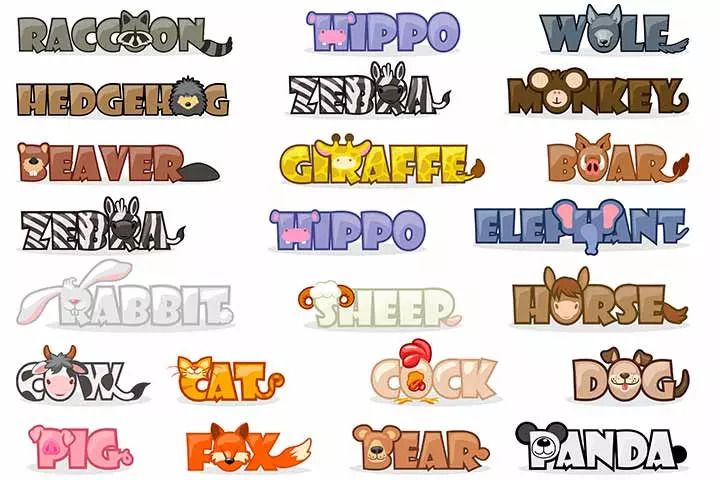
Image: Shutterstock
Name the animal is a multiplayer kids word game that can help teach your children animal names and improve their reasoning skills. This game also offers your child the opportunity to exercise their lateral thinking skills.
Age group: 4 to 7 years
No of players: 2 or more
How to play:
- You can be the host of the game.
- Make a list of common animals and a list of words that rhyme with these animal names.
- Call out each player and present them a rhyming word, and let them guess the animal name. You can say things like, “I rhyme with fog. I am a …..”
- The player who gets the maximum words correct is the winner.
- You can also teach them animal sounds by substituting animal names with their sounds.
3. I spy

Image: Shutterstock
I spy is one of the easiest games of the lot. All you need is your imagination and some eager players.
Age group: 4 to 6 years
No of players: 2 or more
How to play:
- Locate an object, and tell your child its first letter saying, “I Spy an object starting with the letter ….”
- Your child looks around and recognizes each object corresponding to that letter.
- Stop when they get it right and continue the game with the next player.
- You can also mention the color or shape of the object and let your child guess it correctly.
4. Make a word
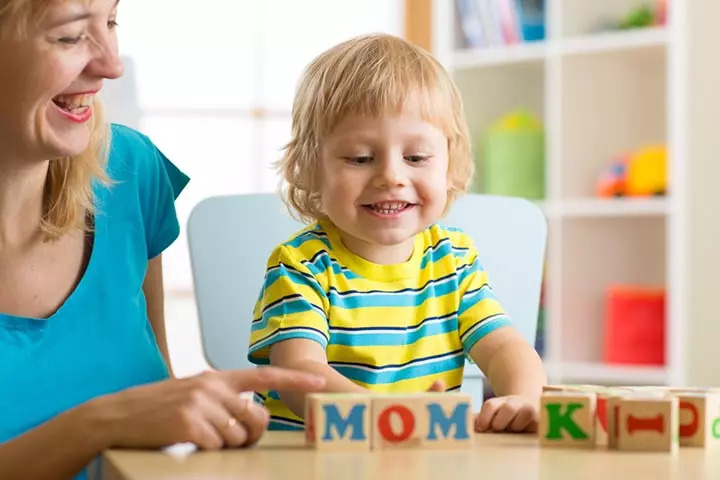
Image: Shutterstock
If your child is starting to learn new words, this word game for kids is useful. You can also play this game with older kids to make them learn difficult words and improve their memory. This game lays a solid foundation for playing advanced spelling games, such as Scrabble.
Age group: 4 to 12 years
No of players: 2 or more
How to play:
- You can play this game with younger children if you have magnetic letters, plastic letters, letter mats, or letter blocks.
- Give them a set of letters and ask them to make two- or three-letter words with them.
- For older children, you can play the game mentally or write a set of letters on a piece of paper and ask them to make as many words as they can from them.
- You can even play a timed version of the game with older children as they enjoy a good challenge.
5. Rhyming words

Image: Shutterstock
Rhyming Words game is a variation of Name the Animal. This word game for kids encourages your child to learn new words and helps hone their reasoning skills.
Age group: For ages 3 to 6 years
No of players: 2 or more
How to play:
- Name any animal.
- Ask your children to say the words that rhyme with the name of the animal, in turns.
- For example, when you say the word “dog,”your children should come up with words such as fog, hog, and log.
- Continue with a player until they run out of words and repeat the game with the next player.
6. Name, place, animal, thing

Image: IStock
You might remember playing this game as a child yourself. This game helps in expanding your child’s knowledge and memory.
Age group: 5 years and above
No of players: 2 or more
How to play:
- Give each player a sheet of paper and a pencil.
- Say a letter of the alphabet and start a timer.
- Each player must write the words of a name, place, animal, or a thing starting with that letter. For example, if the letter is A, a player may write, “Alex, Australia, Ape, Apple,” under each of these categories, respectively.
- You can assign different letters to different players or the same letter to each one.
- You can include other categories as per your convenience.
7. Hink pink
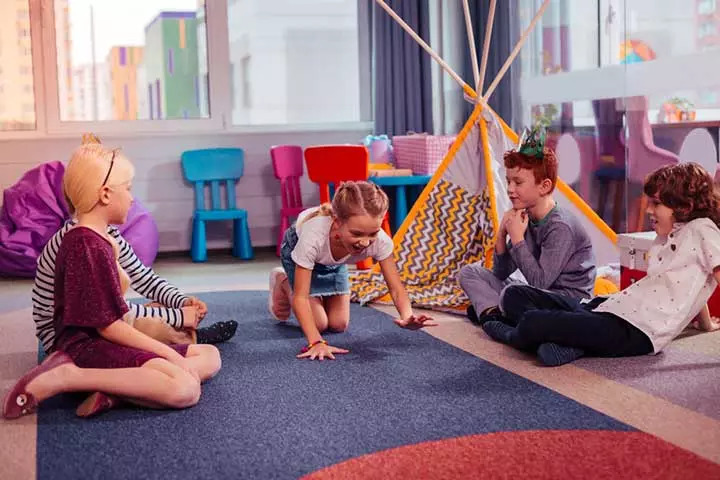
Image: Shutterstock
Children love this game. This word game for kids is designed to maximize fun while learning new words and their meanings. The game can help improve your child’s ability to solve crossword puzzles and cryptic crosswords.
Age group: 4 to 12 years
No of players: 2 or more
How to play:
- Ask each player to come up with a set of rhyming monosyllabic words, e.g., fat rat.
- Help them make a clue about their words. In this case, the clue will be “a rodent that is not thin.”
- Each player says their clue aloud, and the others try to guess what the rhyming words are.
- If the children are older, you can play Hinky Pinky (two-syllable words) or Hinketty Pinketty (three-syllable words). You can even make different combinations between different syllabic words.
- Ask the children to act out the words too so that all of you have lots of fun while the children learn difficult words.
- Here are some more words to get you started: Thin Pin, Big Pig, Tan Pan, Fan Man.
8. Guess the correct word
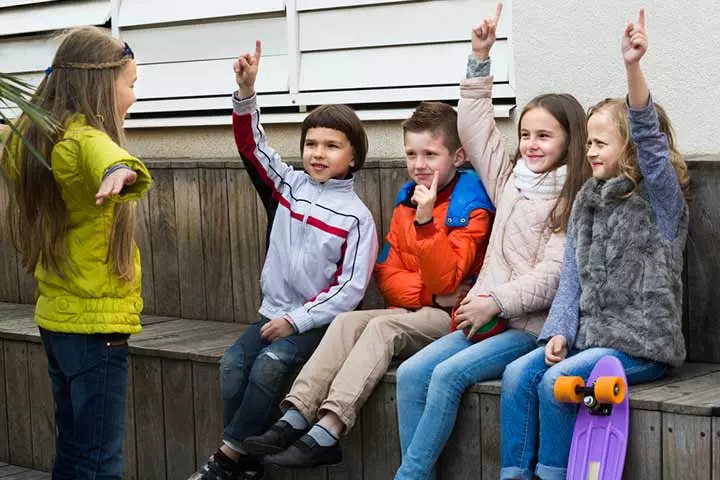
Image: Shutterstock
This word game for kids, if played mentally, is an excellent way to boost your child’s memory. It is a simple game and can be played with pencil and paper if you want to keep score.
Age group: 6 years and above
No of players: 2 or more
How to play:
- The first player thinks of a word and announces its first letter and the number of letters in the word to the others. If the player has thought of the word “Bananas,” they should say B and 6.
- The other players have to guess the word using these clues.
- If a player says another word but it has some matching words with the original word, the first player will say that the word is wrong but there are matching letters in the correct places or the wrong places.
- The next player uses these clues to make the next guess.
- You can keep the words simple or difficult according to the age of the children.
- As for the example of Bananas:
Player 2: Bullock
Player 1: That is incorrect
Player 3: Bahamas
Player 1: That is incorrect, but the As are in the correct place,
and so on.
9. Word hunting
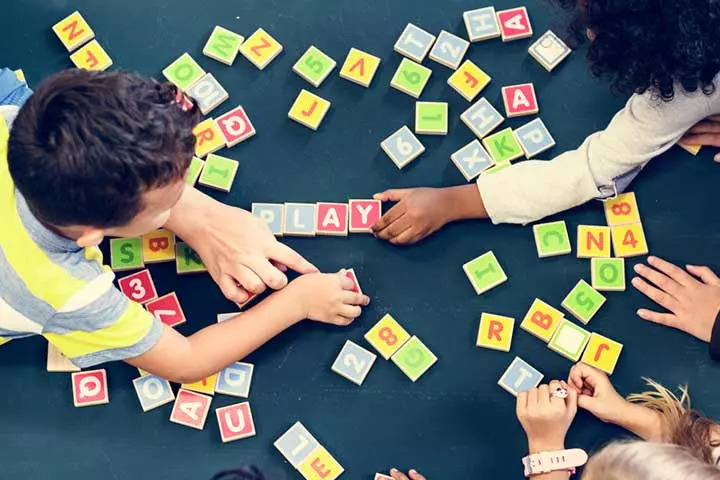
Image: Shutterstock
If your child is just learning the alphabet, this is an easy game to play. However, you can make some minor changes and tweak it for older children.
Age group: 4 to 7 years
No of players: 2 or more
How to play:
- Scatter magnetic letters, plastic letters, or letter blocks on a table.
- Ask your child to pick up a letter from the lot.
- For older children, you can write three- or four-letter words on little chits of paper and do the same procedure as above.
- For children who can read, you can ask them to pick words they see outside shops, etc.
10. Change one letter
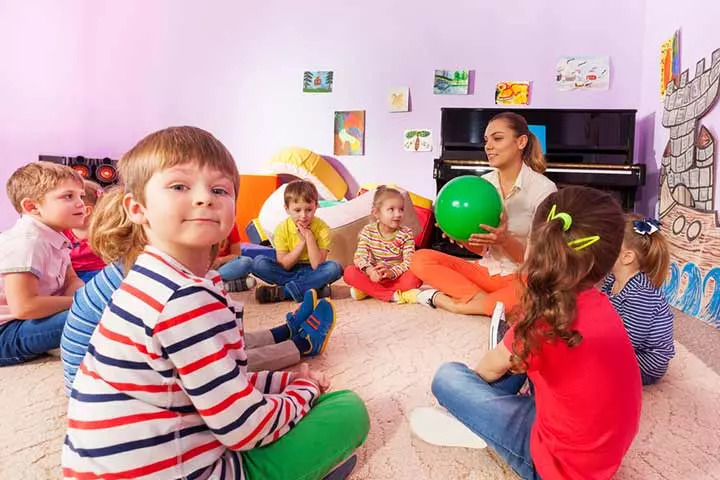
Image: Shutterstock
This is a great word game for school children. The game promotes out-of-the-box thinking and allows your child to come up with new words and even their meanings.
Age group: 5 to 10 years
No of players: 4 or more
How to play:
- Begin with a short word that has three, four, or five letters (according to the age of the children).
- Ask the children to take turns in calling out new words by changing just one letter of the previous word. E.g., park – part – dart – dark / mark – mare – mart / cart – care – case – cast – mast (and so on).
- You can set a timer or divide the players into teams to make the game more exciting.
11. Call my bluff
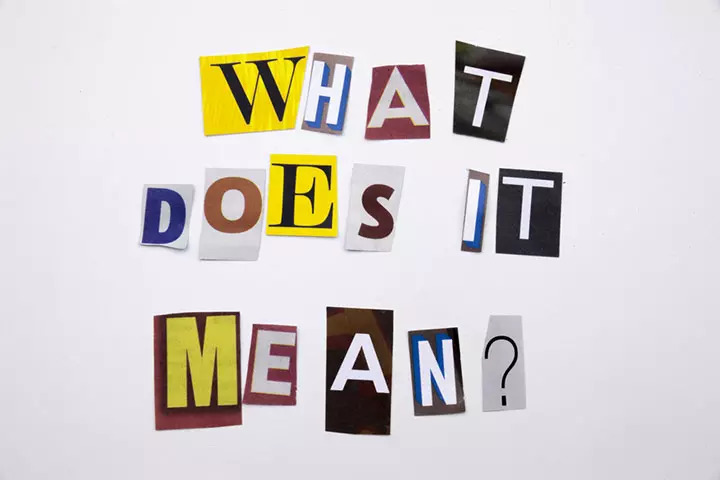
Image: Shutterstock
Call my bluff is commonly played at sleepovers and during picnics and is an excellent word game for older children.
Age group: 8 years and above
No of players: 4 or more
How to play:
- Divide the children into teams.
- Give them a set of words that are common but unfamiliar to them.
- Ask each team to look up the meaning of each word, and make up two wrong meanings for each word.
- Each team asks the other team the meaning of a word and gives them the three options.
- If the opposite team guesses the correct meaning, they get points. If they don’t, the team that asked the meaning gets the point.
- For example, let us take the word “Bewildered.” You can give three choices (a) to be left in the wild, (b) shocked or surprised, and (c) out-of-control behavior.
12. Unscramble the words
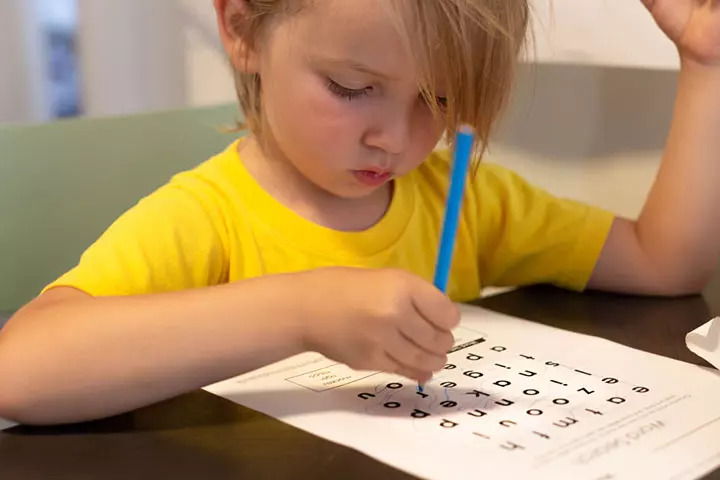
Image: Shutterstock
Let your children put on their thinking caps and play this game. The word game makes your child think and helps stir their imagination and improve their reasoning skills.
Age group: 5 years and above
No of players: 2 or more
How to play:
- Think of a word and write it down on paper but in a scrambled form.
- Your child has to think and arrange the word in the right sequence.
- You could even give clues so that they can unscramble the word faster.
- You could also write down a set of scrambled words, set the timer, and ask them to solve as many as they can within the allotted time.
13. Tell me a story

Image: Shutterstock
Children are incredibly imaginative. Children, as young as three years old, start making imaginary stories. You can play this game to fire your child’s imagination.
Age group: 5 years and above
No of players: 2 or more
How to play:
- Start a “story” with a sentence.
- The next player should say another sentence and continue the story.
- As the story grows, it becomes hilarious and absurd.
- For example, you start with the sentence, “In a village, there was a man named Joe.” The next player can say, “He wore a red shirt every day,” and the next player may say, “One day, a bull charged at him,” and so on.
14. Words in a word
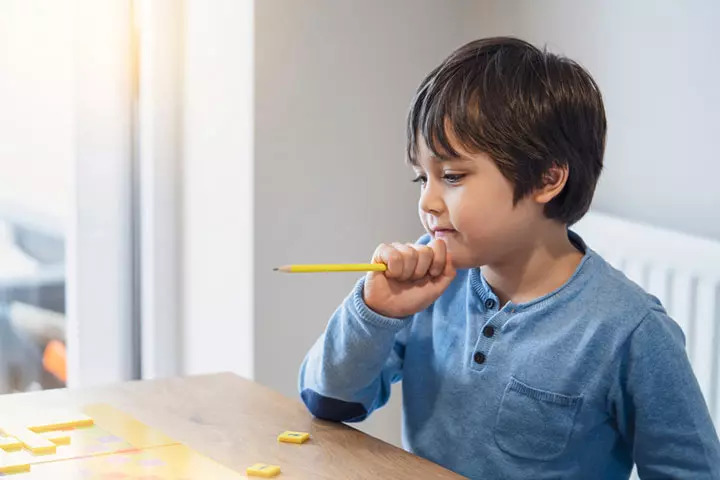
Image: Shutterstock
This is one of the most popular word games for kids and one of the best word-building games of all time. It is useful in improving your child’s English, if it is not your native language. You might have played this game in your childhood. It is now your children’s turn to play the game and keep the tradition alive.
Age group: 5 years and above
No of players: 2 or more
How to play:
- Think of a long word. A popular word choice for this game is “Constantinople.”
- Ask your child to write words starting with each letter in the word. They should use the letters contained in the word only.
- For example, Constantinople can have words such as con, cot, on, oil, no, nap, sit, and sip.
- You can set a timer and ask your child to write down as many words as they can within the given time frame.
15. I’m going on a picnic
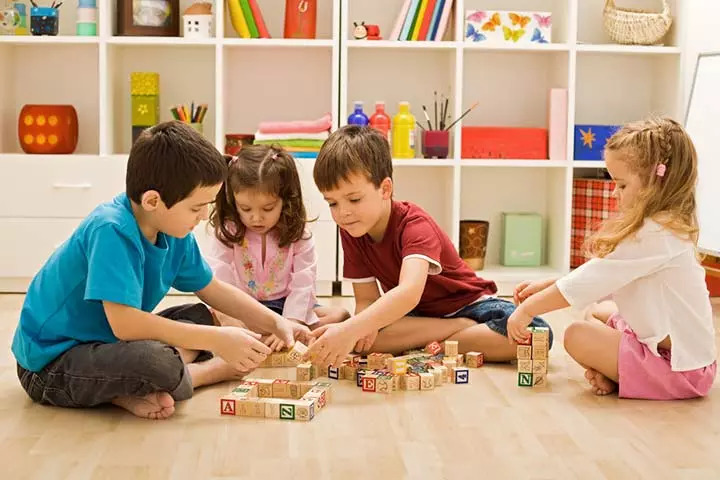
Image: Shutterstock
This game is for older children. It helps hone their creative skills and improves their memory. The word game is usually played in classrooms, but they can play it at a sleepover or even with you as a family game.
Age group: 5 years and above
No of players: 3 or more
How to play:
- The first player starts by saying, “I’m going on a picnic, and I will bring a ….”.
- The next player adds an item to the list and repeats the words.
- Each player has to repeat the items named in the exact sequence.
- If a player forgets a name or the sequence, they are out of the game.
- You can either start the game all over again or ask the next player to pick up the sequence and continue.
- For example, the game goes as follows:
Player 1: I’m going on a picnic, and I will bring a cookie.
Player 2: I’m going on a picnic, and I will bring a cookie and a Popsicle.
Player 3: I’m going on a picnic, and I will bring a cookie and a Popsicle and a bottle of juice, and so on.
16. Crosswords
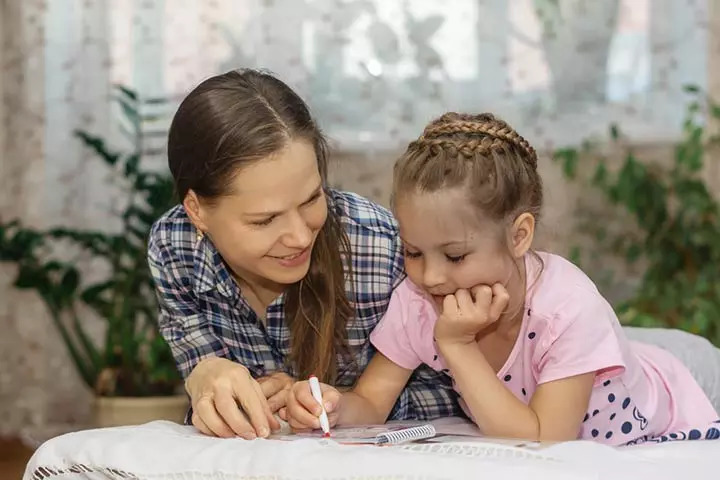
Image: Shutterstock
Solving crosswords requires practice and a lot of patience. The game will not only teach your children new words but also develop their deductive reasoning skills to a great degree.
Age group: 6 years and above
No of players: 1
How to play:
- Draw a grid with white and black squares and number each row and column.
- Then, write a set of clues at the bottom of the grid with the corresponding row or column number.
- Ask your child to solve the crossword.
- You can set a timer to make the game challenging.
- You can get some printable crosswords with clues easily on the Internet (you will find some free and printable crosswords in this link). Crosswords regularly appear in newspapers and magazines.
17. Word quest
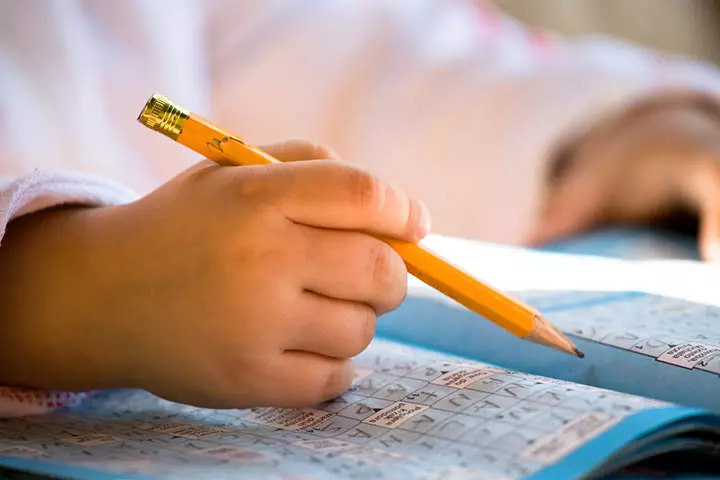
Image: IStock
Word quest is a word game for older kids. The game involves searching for words using single letters and makes your children use their deduction skills.
Age group: 5 years and above
No of players: 2 or more
How to play:
- Draw a 10×10 or 12×12 grid on a sheet of paper and divide it into squares.
- Write various words below and to the side of the grid.
- Write random letters in random squares.
- Ask your child to fill in the grid using the words you have written outside the grid.
18. Consequences

Image: Shutterstock
This word game helps stir the imagination and encourages creativity. The game works well with both children and adults.
Age group: 5 years and above
No of players: 2 or more
How to play:
- The first player writes down a sentence on a sheet of paper and passes it on to the next player.
- The next player writes the next sentence and passes it on.
- Once all the players are done with adding their sentences, you can read out the story.
- You can also write 4–5 sentences with open endings on a sheet of paper and hand them over to each player. Each player writes their version of the story and reads it aloud at the end of the game.
- For example, you can write, “There was a man named …….. He …………. a woman named ……………. They went to …………. He said, “…………………” She said, “……………………” And then, ……………..” and so on.
19. Scrabble
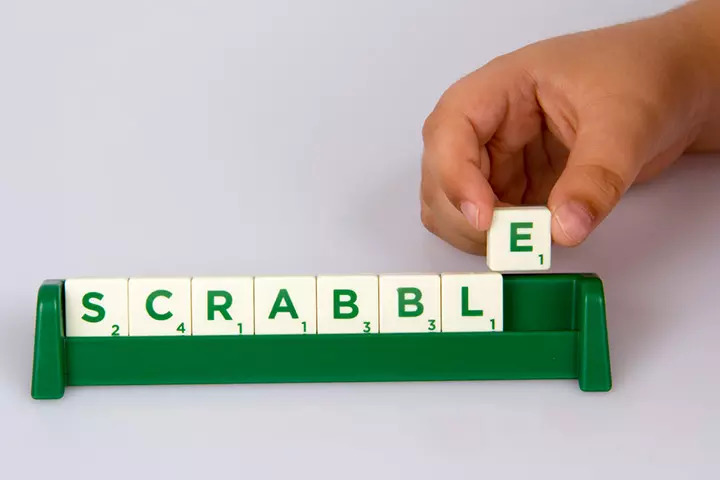
Image: IStock
Scrabble is a popular classic word game for kids. If you want your child to learn new words, this is one of the best games.
Age group: 6 years and above
No of players: 2 or more
How to play:
- Get a scrabble boards.
- Set it up and read the rules.
- The number on each letter tile tells you how many points it’s worth, and the squares on the board tell you how many points you scored.
- The player who gets the maximum score is the winner.
- After a game of Scrabble gets over, the board looks similar to a crossword.
20. Pass the bomb
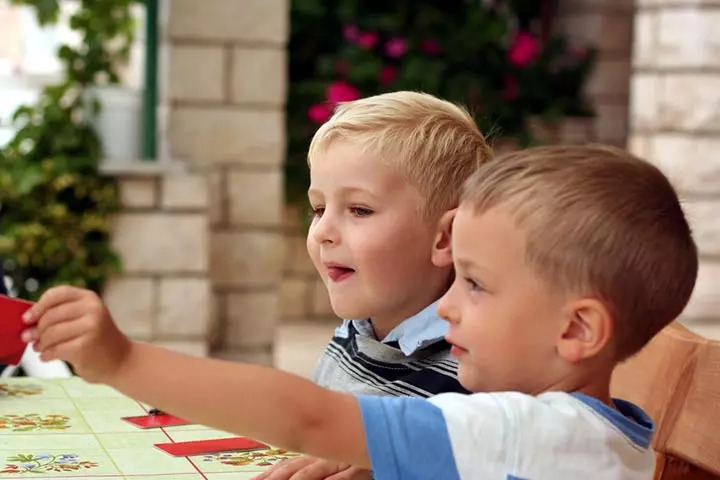
Image: Shutterstock
Pass the bomb is an educational game that will test your child’s alacrity. The first player should say a word and pass the bomb as quickly as possible to the next player, who must say a similar-sounding word. The players need to be quick in passing the bomb before it explodes. You can get this board game at a shop or simply make your own set.
Age group: 5 years and above
No of players: 2 or more
How to play:
- Take a set of card papers and write two- and three-letter words on them with a marker.
- The first player picks up a card and passes it around.
- The “bomb” goes off after a certain time. If you have made the cards at home, you can use a timer or even play music.
- The moment the timer goes off (or the music stops), the player holding the card is out.
- However, before leaving, they have to say a word that contains the word written on the card.
- For example, if the card has “ART” written on it, the child who gets out can say a word with ART in it, such as part, mart, or cart.
1. How can word games help children improve their spelling skills?
When children engage in word games, they are required to focus on the spelling of various words, which helps them to learn and remember the correct spelling of those words.
2. In what ways can word games help children with their grammar?
Word games encourage children to think about language playfully and engagingly, making it easier to understand and remember grammar rules. Word games can also help expand children’s vocabulary, an essential component of good grammar. By learning new words and their meanings, children can improve their ability to express themselves clearly and accurately.
3. How can word games help children improve their vocabulary?
Word games are an excellent way to improve children’s vocabulary skills, as they help them learn new words and reinforce their understanding of familiar ones. Games such as Scrabble, Boggle, and crossword puzzles challenge children to think critically and creatively about words, requiring them to use problem-solving skills to develop new words and find hidden ones.
4. How can word games help children become better readers?
Word games can help children become better readers by improving their vocabulary, spelling, and comprehension skills. Such games require children to identify and create words, helping them to recognize new words and understand their meanings. This eventually improves their reading skills.
When education is imparted as activities and games, children tend to grasp it much faster and retain it longer. So, if you want your children to have great communication skills, fluent vocabulary, and fascinating imagination, involve them in word games for kids. Games, such as I spy, make a word, or hink pink, are effective in keeping children engaged and sharpening their grammar and vocabulary. Another good thing about these games is that you can be involved in playing too. So, choose a suitable word game according to your child’s age and have fun while playing.
Key Pointers
- Word games stimulate the brain to improve reasoning skills, vocabulary, and language skills.
- Spur creativity through games such as I spy, rhyming words, and hink pink.
- Test the memory with games such as guess the correct word and make a word.
Was this article helpful?
The following two tabs change content below.
- Reviewer
- Author
Are you looking for the best word board games to play at home when you have some free time?
Well, there are plenty of options out there, and this article includes the best of them.
So, if you usually like to play with words, you will love this list. Keep reading.
Word Board Games – the Classic Ones
First, let’s look at the word board games that come with a classic approach. These games will surely bring back those sweet memories of your younger age.
Let’s take a look at these awesome, sentimental word board games.
PS: if you are looking for the best board game apps, these guides are just for you.
01. Boggle

Setting a timer, shaking the letters, and seeing where they fall will help you improve your Boggle skills. That is true even if your brain doesn’t operate that way.
Before the timer runs out, try to come up with as many four-letter words as possible. Because Super Boggle can be a little larger, each game lasts for three minutes instead of the usual two. This, of course, can surely be rated as one of the best word board games.
Besides, if you are looking for an awesome Chinese gambling game, we have it covered in this article.
02. Scrabble

Scrabble is a popular, classic-type word board game suitable for players aged 8 and above. To score points, players use letter tiles to form words.
03. Bananagrams

Bananagrams, just like the name suggests, is an interesting word game similar to Scrabble. This game can be experienced and enjoyed by all members of the household with ease.
It’s all about spelling in this game as players try to create puzzle word grids. Games like Bananagrams are excellent word board games to take on the road since it’s small and lightweight.
04. Hangman

Something about Hangman seems a little risqué these days, to be honest. Magnetic Hangman can be considered great for traveling since it’s small as well as portable.
You can even pick up a pen and paper or chalk and a blackboard and start playing. That’s particularly if you like to play with an old-school method.
05. Scattergories

Scattergories are one of the all-time favorites of many adults during their childhood. And this should be in every home.
Fill in sections just using words that begin with the letter you roll on the dice for. The better it is if it’s one of a kind and lengthy.
06. Mad Libs

In the 1990s, Mad Libs, in fact, were all the rage. Perhaps, you will not consider them a “board game.” However, they are a good way for budding writers to practice their vocabulary easily.
If you have a half-written narrative, take out a pen and finish it off. An adjective, a noun, or something somewhat more specific is requested for each blank. Have fun with it! Your story doesn’t have to be serious and realistic to be entertaining.
Best Word Board Games that Have Similarities with Scrabble
Now that we know some of the best classic word board games. Let’s learn about games like Scrabble too. Mentioned below is a good list of word games that are similar to Scrabble.
01. Dabble

Dabble is a fun word game for the whole family. Players compete in spelling five words out of a possible 20 using all 20 tiles.
This word-making game may be played by two to four people and is excellent for improving one’s spelling. It will also improve the vocabulary of the players.
02. Quiddler

Quiddler is a fast-paced game for 1–10 players in which players must form short phrases. To do that, they should use the letter cards they have in their hands.
Players take on additional cards as the round progresses. Moreover, the one with the highest score at the end of the game wins.
03. Upwords

Similar to the game “Scrabble,” Upwords allows players to construct words on already existing ones. More points are awarded for greater letter stacks. 2-4 players, 8+, are required to play Upwords.
04. I’m the winner

Make a specific word out of the upside-down tiles in the middle of the table first. You should, however, be wary of other players adding his or her own letters to your phrase.
And those are the most impressive word board games similar to Scrabble.
Word Board Games that Are Ideal to Be Played As a Family
There are some great word board games that can be played together as a family. If you want to learn about the best word board games that fall into that category, keep reading.
01. Super Big Boggle

This game is one of several variations on the classic word game called “Boggle.” Think about it as a 66 version of Boggle. The players must come up with as many terms as possible in six minutes.
02. The Pen Is In Your Hands

For families, this game is fast-paced, enjoyable, and involves both words and art. After a 10-second countdown, you have to create an image, and everyone else has to predict what it is. Points are awarded for accurate guesses. If you don’t, the pen goes to the next person.
03. Crazy Letters

This is a family-friendly game based on words for school-aged children (10+) that is less well-known. Is it possible to decipher a word with its characters reversed? Words may be simple or difficult, depending on their difficulty level.
04. The Final Letter

All players must come up with a term that describes what is shown on their cards. To begin, the first letter of the new phrase must be taken from the previous phrase’s last letter.
You don’t keep the card if you yell out your word first. The winner is determined by who can get rid of their cards the fastest.
05. Word A Round

This is a critically acclaimed and family-friendly board game. A continuous ring of words surrounds the image. To win, players must find the beginning of the word. They also should become the first to recite it to the other players.
06. Danger World

Danger Word, the show hosted by Ellen DeGeneres, is suitable for viewers aged ten and above. However, the card is lost if you pronounce the danger word instead of the winning word.
07. It’s in the Bag

Do you like word board games with charades & Pictionary? If so, you should give “It’s In The Bag” a try. All three rounds consist of one-word descriptions followed by an act-out of the description.
08. Blank Slate

Blank Slate is a word predicting board game that asks players to guess what the other players are thinking. Complete the sentence with a word and gain points if your word matches the one used by others.
Best Word Board Games that Are Suitable for Teens and Adults
Are you looking for the best word board games that are suitable for teens and adults? If that’s the case, mentioned below are the best games you can think of.
01. 4-Bidden Words

Suitable for players aged 17 and above, players fight against the clock to predict the Buzz Word. Also, they should avoid any of the 4-Bidden Words’ prohibited word combinations.
This guessing word game for adults is ideal for celebrations such as family reunions and birthday parties.
02. Balderdash

There’s something for everyone in Balderdash: teens, adults, and young adults. The categories include famous individuals, initials, words, movies, players, and laws. Choose one by rolling the dice.
As per the game, one person enters the accurate answer. After that, another person puts down what they believe to be the true definition or explanation. A popular vote amongst the players determines the correct response.
03. Codenames

Codenames is an up-to-date, communal word game for players 14 and above. It works best with four players. Teams fight to be the first to contact all of their hidden spies. One-word hints from spymasters point to several words just on board.
Members of the same team must avoid guessing the meaning of each other’s statements. Be careful not to attract the assassin’s attention.
04. Taboo

For those aged 13 and above, Taboo is a time-honored word game. This is a favorite of ours to perform over the winter holidays. Use the clues to deduce the word’s meaning while avoiding using the banned phrase.
For those of you who are 17 and above, this is the competition for you. What Kind of Stuff Do You Meme for Fun? Well, it is a fun new adult-only word game that’s guaranteed to have you laughing. Expansion packs are also available for purchase.
Are you stuck inside on a wet day and don’t know what to do? Consider pinning these word-themed games for later.
Honorable mentions
Here are some other best word board games you can try.
01. Tapple

Playing Tapple will test your word-finding skills. It’s one of the 10 finest word board games out there. When playing Scrabble becomes tedious due to the slowness of the game, switch to Words with Friends.
Scattergories and Tapple are both games of the same genre. If a word begins with a certain letter, that letter is immediately dropped from the game’s alphabet. After then, it’s the turn of someone else.
Assume that the first participant has to identify a fruit & she says “apple.” Then, no one else may use words that begin with the letter “a” for the remainder of the game. As letters are removed, the game grows more difficult to play.
02. Pairs in Pears

The same people both produce Bananagrams and Pairs in Pears, and they’re both a lot of fun. It’s packaged in a nice fruit bag, similar to Bananagrams.
Also, it encourages wordplay that is good for whatever you are doing with it. As implied by the game’s name, the objective is to match up two crossing words.
When two words cross, the first word would be read from right to left. Then, the second word would be read vertically. They’d appear as crossword puzzle words since they share a letter.
Pairs in Pears allows youngsters as younger as seven to utilize short words with just three letters. Like Bananagrams, it’s easy to carry along because of the compact pieces and handy pouch. Just watch out for those in the trunk!
03. Mad Gab

In terms of word games, this is a real outlier. To begin, one selects a card that seems to be a jumble of non sequitur. The word should not make any logical sense. To decipher the hidden message, pronounce the phrases out loud.
This is a fantastic party game. Age-wise, Mad Gab is best suited to youngsters who are proficient readers. Since each card works as a puzzle, there’s a countdown ticking down the left.
So, Mad Gab is definitely best suited for kids who aren’t often discouraged by tight deadlines or difficult assignments. On the other hand, this game should be a hit with adults.
So, those are the best word board games we can mention. Do you have any other word board games to include in this list? Please let us know.
A list of fun English word games for kids to help improve children’s spelling, reading, and vocabulary. This list of word games for kids includes word games that encourage conversation and early literacy that you can play on the spot or prepare yourself with just some paper and pencil.
Why are Word Games Good For Kids?
Word games and vocabulary games for kids are great because they get kids talking and using language while having fun. When you make a learning activity fun, kids don’t realise they are learning.
For reluctant learners, playing these word games can help and motivate them to want to play and learn more.
*This post may contain affiliate links, read more here.
10 Fun Word Games for Kids
Many of these word games for kids can be prepared easily at home with materials you already have. However if you don’t have time to prepare your own, you can also purchase a range of fun word games for kids HERE.
1. Hang Man

Probably one of the most popular word games for kids is the popular Hang Man. Player 1 thinks of a word and Player 2 has to guess it before they get “hung.”
Player 1 writes spaces for letters are written on the page so they know how many letters there are in the word. Player 2 proceeds to choose a letter they think may be in the word.
If it is correct Player 1 writes the letter down where it goes. If it is incorrect Player 1 draws part of the “hangman”. If the drawing is complete by the time Player 2 guesses, then Player 1 wins.
2. I spy
A really easy and fun word game for kids is I spy. You don’t need anything for this game except your imagination.
Player 1 thinks of a word and tells the others the first letter. “I spy with my little eye, something beginning with __” The other players need to guess the word. Whoever wins gets to be the spy!
This is a really great car game for kids too and helps to build vocabulary.
3. Bingo
Such an easy word game to prepare for kids. There are some really good versions on Amazon HERE. You can purchase the game, or use it as an example to make your own.
Draw a square grid on a page and choose a theme. Write out some words using the theme. Eg, beach: swimming, sand castles, water, sea shells, dolphin, sunbeds, picnic etc.
Make an extra copy of the words ensuring there are a few extra than the amount on the page. Cut them up into squares and put in a bowl scrunched up.
Take turns in pulling out a word and reading it out loud, then finding it on your page. The first person to find all of the words calls out Bingo and is the winner.
This fun word game for kids helps with reading and talking aloud.
4. Word Family Game
This game requires children to rhyme. Select one word and everyone needs to write as many words as they can that rhyme with that word. Eg. If the word is “Cat”, answers could be: hat, bat, rat, sat etc.
This is a great word game to help build kids vocabulary and help their language skills.
5. Word Search
Another fun but challenging word game for kids is a word search. Draw a grid of 10 x 10 squares and place as many words as you can within the grid. Words can go up, down, or diagonal, and letters can overlap to be used more than once.
Create a list on the side or bottom of the page of the words you have entered. Then once you cannot fit anymore words in, fill the blank boxes with random letters.
Kids will need to find the words as quick as possible. This can be a fun word game to do individually or as a team. For kids who like to compete, you can make identical grids and see who finishes first.
This word game encourages persistence and helps to improve their literacy skills.
6. Unscramble the words
A simple word game for children that will get them really thinking! Write a list of words down on paper but scramble the letter order while writing. Kids will need to look at the letters and try to work out what the word is and guess it.
This can be quite a competitive word game, but it helps to really get their mind ticking.
7. Scategories
While this is also an official board game, (which you can find online here) you can also make it yourself quite easily. Each player has a piece of paper and pencil.
Select 10-15 categories. These can be anything you like but remember they should be popular enough that you can guess something with most letters. Eg. Country, Movie, Body Part, Actor or Actress etc.
Once you have your categories it is time to choose a letter. Without a dice, the easiest way is to write the letters randomly on a piece of paper.
Then one person closes their eyes and points to a letter. When the letter has been chosen, players have 2 minutes to fill in the gaps with something in each category starting with that letter.
Winner is the one with the most filled in at the end, or the first to finish.
This is a really fun and competitive word game for kids that helps to improve their vocabulary, spelling, and conversation skills.
8. Words within a word
This word game requires kids to create their own words. Choose one really long word with at least 8-10 letters. The longer the better.
The aim of this word game is for kids to try to make a list of small words out of the letters of the long word. So for example the word COMPUTER includes: put, cot, term, core, mop, top, pet. Etc.
This is a really fun word game to help children’s spelling skills.
9. I am going on a picnic
A fun word game to help with your child’s memory and to get them talking.
One person starts and says “I am going on a picnic and I will bring some… fruit”
The next person says what the first person said, and adds something of their own. “I am going on a picnic and I will bring some fruit, and some sandwiches.
The next person says what the first, and second person said, and adds something of their own. “I am going on a picnic and I will bring some fruit, some sandwiches and some ice-cream.
You continue on and on and it gets more difficult to remember everything. We usually can get to at least seven or eight, and surprisingly my pre-schooler can often remember more than me!
This conversational game helps with memory, and also learning new vocabulary.
10. Story prompts
This word game involves making up a story by taking turns in saying sentences. One person starts the story, and says the first sentence. The second person continues the story with another sentence, and so on.
The stories can become very interesting as each person has different ideas. Bilingual flashcards are great for this or you can find a great version online HERE.
This conversation activity helps kid’s imagination, as well as building their vocabulary.
Other Fun Learning Resources for Kids?
If you love these English word games, check out these posts!
English Classroom Games – To play in class or at home
Knock Knock Jokes – To get the kids laughing
Best Board Games for Kids – Educational and fun
Top Book Sets for Kids – For all ages
Which English word games do you play with your kids?
These fun English word games for kids can be played with children of all ages and also with adults just by adapting certain aspects of the game to suit the age of the player.
This list of word games for kids will keep kids entertained for hours on end without feeling like they are actually learning.


If you’re a wordsmith, a word-wiz, or just enjoy a little wordplay, these word board games are right up your vocabulary alley. Word board games can be used as an educational tool, as a hilarious party game, or simply as a way to keep your wordy wits about you. If you’re not into word games, don’t fret, word unscrambling tools can give you an assist in any word game while improving your vocabulary.
So on-words and up-words, here are our top 20 best word board games!
Like Word Games? Why not also check out our list of Puzzle Games and Trivia Games that keep you mentally active, while still having fun?
🏆 Our Top Picks for Best Word Board Games
In a hurry? Take a quick peek before you go.
Best Team
4.0
Best Quick
3.8
Best Overall
4.2
04/11/2023 05:30 pm GMT
When I Dream
Players: 4-10
Playing time: 20-40 min
Put on your sleep masks and try to decipher your dreams!
When we fall asleep and enter a dream world, the imagination and imagery can be truly magical. When I Dream turns players into dreamers. Be careful when entering the magical world of dreams because the Dream Spirits want to have fun!
When I Dream is an innovative game that puts a focus on creativity and player imagination. Put on your sleep mask and try to interpret the Dream Spirits messages. With fairies, naughty spirits, and even the Boogeyman, the game has an array of characters that make it challenging and that give the game depth.
This is an excellent fast-paced party game that’ll have you storytelling before the Boogeyman wreaks havoc!
What we liked
When I Dream offers some new unique mechanics that give the word game genre something to think about. Combine that with the gorgeous artwork and you get a really pretty and fun game.
What could be better
With the timer included, it can rapidly descend into chaos.
Werewords
Players: 4-10
Playing time: 10 min
Guess the magic word!
In Werewords, players must guess a secret word by asking ‘yes’ or ‘no’ questions. Be careful, time catches up to you! Like in most games, there’s always a villain looming and trying to interrupt play. In Werewords, one player is secretly a werewolf.
Not only is this player working against you, but they also know the Magic Word. Even if you don’t guess the word in time, you still have the chance of exposing the werewolf and winning the game!
What’s cool about this word game is that it comes with an iOS/Android app that’ll provide thousands of words in hundreds of categories giving the game-high replayability.
What we liked
It’s like One Night Ultimate Werewolf but combined with a word game. It’s a weird combination that seems to work very well.
What could be better
Like the original Werewolf, Werewords suffers from similar role management. There are only a handful of roles that are really fun to play, but most players end up as villagers.
Will you figure out the word or will the werewolf get you? Better get your top wordsmith on the case.
Trapwords
Players: 4-8
Playing time: 30-45 min
You know the secret word your teammates must guess. You’ll give clues to help but the other team has other plans in mind. They’ve set a list of ‘trapwords’. You can’t say them or you’ll end up trapped in dungeons with terrifying monsters. Easy enough? Oh, there’s also a time limit.
Trap words is a fast-paced party game that seems like a simple task of giving clues but gets more challenging by not knowing which words can be said.
If you’re looking for a word game with a fantasy theme, Trapwords takes you into the fantasy world of dungeons and monsters.
What we liked
Trapwords is a fun fantasy variation of Taboo. The rules are changed enough to make it more interesting to play than Taboo.
What could be better
The timer can be tricky, especially for younger players.
Decrypto
Players: 3-8
Playing time: 15-45 min
Decrypto has a fun vintage aesthetic, surely making it a favorite among the hipster community. But really, this word game blends decoding and player interaction through interesting mechanics.
In this game, teammates try to transmit secret codes without letting the opposing team intercept them. Using clever graphic anaglyph components, players slide cards into the screens to decode the words.
The communication limits make Decrypto a fun and challenging word game to play, plus you’ll feel like a code breaker sending secret messages.
What we liked
The option to guess the other team’s words and clues adds another level to a fun word game.
What could be better
I’m not sure why, but I had trouble with Decrypto’s rules. It took me far longer than it should have to understand everything and teach it to my gaming group. It could have just been me, but it did give me trouble.
Letter Jam
Players: 2–6
Playing time: 45 min
Your friend gives the clue. Can you guess your secret letter?
Letter Jam is a cooperative word game where players work together to compose meaningful words from letters around the table. But the twist is only the other players can see your letter cards, not you.
Letter Jam combines team-based play and players’ deduction skills. Pull together as a team, find the clues, and reap the fruits of cooperation!
Jam out at the next game night and decipher the codes!
What we liked
Under its simple exterior, Letter Jam offers a cerebral word game that delivers more gameplay the longer you play.
What could be better
It’s played best with more players and is all but obsolete at 2-players.
Bananagrams
Players: 1-8
Playing time: 15 mins
A fun game for everyone that’ll drive you bananas.
Gather your friends and family and race against each other to build crossword grids. Bananagrams is an educational and entertaining game with which you can teach kids how to spell words all while having fun at the same time.
In Bananagrams, players have to build their words with letters as fast as they possibly can. A race to finish, speed, and a great vocabulary make the game super exciting.
What we liked
The game is in a case that’s shaped like an actual banana, making it a great travel game. It can fit in any bag and it comes in a cute package. What’s not to like?
What could be better
If you have trouble with words then the real-time movements and actions can be tricky to deal with.
Blank Slate
Players: 3-8
Playing time: 20-35 min
The game where great minds think alike.
Blank Slate is a game of predictions. “The game where great _ _ _ _ _ think alike!” Easy to learn and quick to play makes Blank Slate a fun game for all levels.
By picking a word cue card, you’ll write which word you think best completes a phrase. To take this a step further, you’ll have to try to match it to another player’s words.
In this clever party game, prediction skills are key to matching words. If you get good enough you’ll soon be winning the _ _ _ _!
What we liked
Blank Slate is a simple and very fast-playing word game. It works very well as an icebreaker and introduction for people who just met.
What could be better
Your enjoyment of Blank Slate is going to highly depend on who you are playing with.
Codenames
Players: 2-8
Playing time: 15 min
‘The top-secret word game. Win or lose, it’s fun to figure out the clues!’
There are good reasons why Codenames has become a staple on board gamers’ shelves. Codenames is a deceptively awesome game that’s easy to learn and perfect for parties.
Codenames is a social word game in which two rival spymasters know 25 secret agents. Their teams only know agents by codenames. Make contact with all your agents first and win. Although this game can be challenging, the social component keeps everyone entertained as they race to finish first.
This is a fun game when you’re winning, but even better when you’re losing.
What we liked
Codenames is quick, easy to learn, and a blast. There’s a reason it’s become a go-to game in so many households.
What could be better
There’s a lot of hype surrounding Codenames. There are numerous games out there that do the same thing, Codenames just does it really well. If you’re looking for something innovative and unique, you’ll be disappointed.
More versions of Codenames
Poetry for Neanderthals
Players: 2-12
Playing time: 15 min
A word game where you must ‘speak good’ or get hit with a stick.
Poetry for Neandertals is a competitive word-guessing game. Players are only allowed to use single-syllable words to give clues to their team to guess the phrase.
For example, the word is broccoli, you’ll have to say something like, ‘green food, live long’. Use a big word, you’ll get hit on the head with a 2-foot-long inflatable club.
From the geniuses that brought us Exploding Kittens, Poetry for Neandertals is another fun addition to a game night. With only 15 minutes to play, this hilarious, challenging, cutthroat game tests the patience of logophiles the world over.
What we liked
If you’re a fan of The Oatmeal webcomic, you’re going to love the artwork and irreverent humor. It’s just as ridiculous and fun as it looks.
What could be better
The humor is a bit low-brow. If you’re not comfortable speaking oddly and smacking friends over the head, then this is probably going to be a miss.
Just One
Players: 3-7
Playing time: 20 min
A cooperative party game where you’ll have to work together to discover the mystery words!
Just One starts with one player drawing a card and choosing a number from it. Each player gets one clue word and together you’ll try to solve the mystery word. Just One is a brilliant word game as it combines cooperative skills with deduction, memory, and creative thinking.
What we liked
I really like the mechanic that discards identical clues. This forces you to be strategic and creative with your clues. Easy-to-learn and easy to play make Just One a relaxed game for everyone.
What could be better
Just One is great, but it can feel as if turns take forever and that’s not good for a party game.
Punderdome
Players: 3- 99
Playing time: 30-90 min
A card game for the pun lovers among us.
Punderdome will have you laughing out loud with its punny cards and creative style of play.
Once a pun a time, the creators of Punderdome saw a space in the word game market for a pun game for family and friends. With pun jokes on the back of each card, you can entertain the crowds while waiting to come up with a pun. Some can take longer than others but you can play with no time limits.
If you’re a pun lover, this is a punderful card game that you won’t regret purchasing.
What we liked
Unlike many of the other games on this list, Punderdome offers quite a lot of opportunities for creativity. It lets you create something instead of just showing off your knowledge of vocabulary.
What could be better
It’s a game about puns. You’re going to be groaning and laughing, but if you’re not well-versed in puns and dad jokes, it may be a little dry.
Quiddler
Players: 1-8
Playing time: 30 min
Quiddler: Simply for the fun of words.
Quiddler is a short word game that’s a great pick for word lovers as well as non-word-game players. With this card game, the goal is to arrange your cards in your hand to create one or more words.
If you deal more cards, you’ll have more opportunities to create words. At the end of the game, the highest score wins.
Quiddler is a sort of Uno-style word game as some cards can double letters and add bonuses to your points. Sharpening your word skills and a bit of luck will have you winning Quiddler!
What we liked
Quiddler makes for a great travel game. It’s simple enough that anyone can play and it’s so easy to pull it out and play wherever you are.
What could be better
Quiddler relies on luck of the draw to get letters. If you have an extensive vocabulary you can overcome bad draws, but it’s still luck-based.
Hot Words
Players: 4-16
Playing time: 20-30 min
Hot Words is a party game where you can’t say that.
In Hot Words, you’ll describe words while your team tries to guess what the word is. In each of the 4 rounds, your team will pick a spicy jalapeño card that has a ‘Hot Word’ on it that you can’t say.
As each round goes by, it’ll get hotter and harder but also more hilarious trying to avoid all the ‘Hot Words’ your team has accumulated.
What we liked
Hot Words provides a simple concept and puts it together in a nice little package. It’s a wordplay game that has a ton of replayability.
With fun added elements like a ghost pepper round, a 90-second sand timer, a dinner bell, and little hot sauce bottles, Hot Words is a fun and exciting party game!
What could be better
If you’re looking for a smaller group game, Hot Words is best played as a party game with more players.
Can you handle the heat?
Dabble
Players: 2-4
Playing time: 30-60 min
The game where if you can spell, you can play!
Dabble is a fast word game that’s both educational and fun. To start the game you say ‘GO!’ and players race to spell 5 words using 20 tiles. The first person to spell their word wins!
What we liked
The added difficulty of making multiple words of varying sizes seems like a simple concept but definitely makes Dabble stand out.
What could be better
Like a lot of word games, if you have someone who memorizes vocabulary words in their free time, they’ll absolutely destroy everyone. It’s best to play with people of the same skill and vocabulary level.
Word a Round
Players: 2
Playing time: 20 min
Race to unravel the word!
Word a Round is a challenging word game where you’ll have to quickly figure out where the word starts and then read it aloud before your opponent. As you answer on the spot, the game becomes a little more difficult as you race to answer. Mistakes are made under pressure so players have to have their wits about them.
Word a Round is an award-winning card game that’s a great educational tool in classrooms or at home. It helps develop critical thinking skills, making it a favorite among speech therapists. If you are looking for a fun game that’ll also help with learning, this is a great choice.
What we liked
Word a Round can be learned in seconds and it’s one of the most unique word games on this list.
What could be better
Since this requires you to guess at words around a circular card, it can be difficult for people with visual impairments.
Word on the Street
Players: 2-10
Playing time: 20 min
A hilarious tug of words.
Word on the Street is a card game in which players take turns flipping category cards, racing the clock to come up with the answer. With each correct answer, you move closer to the sidewalk… and to safety.
With 432 different categories, there is huge variation and replayability. This game is particularly focused on being educational. It helps players improve their vocabulary, practice spelling, and develop social skills.
What we liked
Word on the Street is a simple enough word game but combines wordplay with enough strategy to make it unique.
What could be better
You’ll need to have quick recall of your vocabulary, so if you’re looking for a slow burn game then this is not what you’re looking for.
Wordplay: Family Edition
Players: 2
If your family loves word games, WordPlay is a fast-paced challenge in which everyone plays every round.
A fun spinner determines the letters and the category for each round. For example, ‘Food and Drinks’ means you can only use words that begin with the letter ‘E’. The difference with this family edition is even if you think of things that don’t start with the correct letter, you still score some points.
This game is a friendly and inclusive way to help kids learn and be introduced to the wonderful world of word board games.
What we liked
Wordplay is a simple word game that appeals to everyone. It’s simple enough that anyone can pick it up and have some fun right out of the box.
What could be better
Wordplay’s universal appeal means that there’s no real innovation or new mechanics. It’s fun, but you’ve seen it before and will see it again in other word games.
Upwords
Players: 1-4
Playing time: 90 min
Upwords a game of quick stacking and word hacking.
In this word-building game, the higher you stack, the higher your score. With each player starting out with 7 words that you can play up or down, the game almost feels like Scrabble.
But here, you can stack letters on top of others. When you stack letters higher on each other, you earn more points. This makes Upwords more intense and strategic.
Upwords is very versatile and can be played solo to challenge yourself, with kids, or with your friends. Experience this high-stakes, high-stacking word game, and grow your vocabulary as you go!
What we liked
I honestly prefer Upwords over Scrabble. The tile stacking adds a whole new dimension to the classic wordplay formula.
What could be better
It’s a minor issue, but I’m not a fan of the components on the deluxe board. They work fine, but the color scheme makes it difficult to see for me.
Wordical
Players: 2-8
The radical, dice-rolling, word-building race!
Wordical is another educational word game in which players roll a vowel die and combine consonants to make a word. It’s a fun way for kids to develop their spelling skills and build vocabulary. It’s easy to learn and moves quickly so there are no long pauses.
This is a wonderful game for the classroom or for students who are struggling with their phonics.
What we liked
The dice add an interesting twist to this word game. Randomness is usually added through other means, but it’s a refreshing take on the word game genre.
What could be better
It’s a simple travel game, so the rules and gameplay are very simple. You won’t find in-depth strategy here, but that’s ok for a word game.
Wordsmithery
Players: 2- 99
Playing time: 20 min
The game for every wordsmith, young and old.
Wordsmithery is a fun, fast-paced game in which you can test your wordsmith skills. Draw a word, read it to your opponent, and see if they can guess the meaning from the three options.
With some difficult words like ‘egregious’ or ‘phalanx’, it could seem difficult for children but included are 50 easier cards for kids. The different levels of difficulty make this a family-friendly word board game.
What we liked
The concept is extremely easy to understand and the word choices are genuinely fun to play with.
What could be better
Eventually, you’re going to memorize all of the words available in the box. There are only so many times you can be surprised by a word before we simply learn it.
Wrap-Up
What are your favorite word games to play? We hope you enjoyed our top picks for the best word board games out there! Let us know in the comments if you’ve tried any of these or if we missed any that you think should be on the list. We’d love to hear from you!
Happy Wordsmithing!
Kendra has always been a hardcore fantasy nerd. Growing up in the worlds of Tolkien, Sanderson, Jordan, and Abercrombie, DnD & board games just came naturally. She and her husband, Bryan, started GameCows.com in 2018 as a fun passion project that just took over their lives. An avid board gamer since childhood and chronic DnD chronicler for more than two decades, she loves to play, write, travel, and learn dead languages.

